
Lisova Polyana is a place where Ukrainian soldiers get help to restore mental balance after the trauma of war. Clinical psychologists, physical therapists, case managers, and other not only medical specialists work with the military. Virtual reality and neurofeedback techniques are used here, as well as some new for Ukraine psychotherapeutic techniques. Mild brain injury is not treated with IVs, and it is categorically denied that every second person in Ukraine will have PTSD after the end of the war. Rubryka visited the only facility in Ukraine with such a wide range of assistance to veterans.
What is the problem?
With the beginning of the full-scale Russian aggression in Ukraine in February 2022, the number of people who received severe physical and psychological injuries increased several times. Most often, these are military personnel and members of their families.
Approximately 20 to 40% of service members need psychological help. Symptoms of acute trauma are found in 60 to 80% of soldiers who witnessed the death of fellow citizens or civilians or saw the bodies of the dead.
What is the solution?
The state institution Lisova Polyana Center for Mental Health and Rehabilitation of Veterans of the Ministry of Health of Ukraine operates using the biopsychosocial model of care, which involves the joint work of doctors, psychologists, psychotherapists and psychiatrists, nurses, physical rehabilitators, social workers, other specialists, and patients themselves.
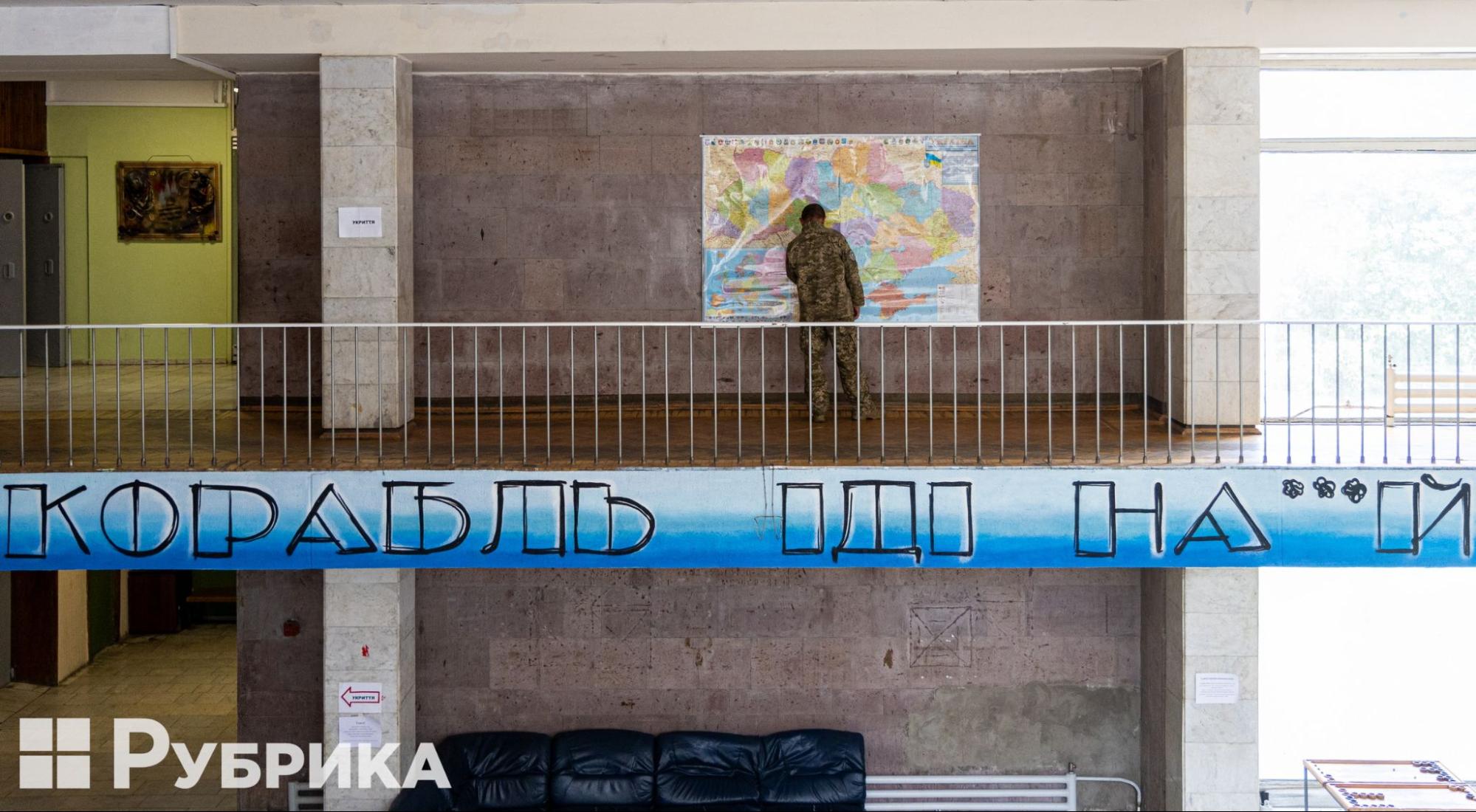
There is a lot of graffiti and paintings on the interior of the hospital.
How does it work?
Trust and security are the two supports that the institution provides to people first
Pushcha-Vodytsia neighborhood in the northwestern part of Kyiv greets visitors with a large green area with alleys, benches, and sites for various types of recreation. The main alley leads to a two-story building. In its spacious hall are many men in uniform and civilian clothes. Some are playing billiards, others are starting a chess game, and someone is talking on the phone while swinging in a hammock chair. It is not noisy and cozy around.
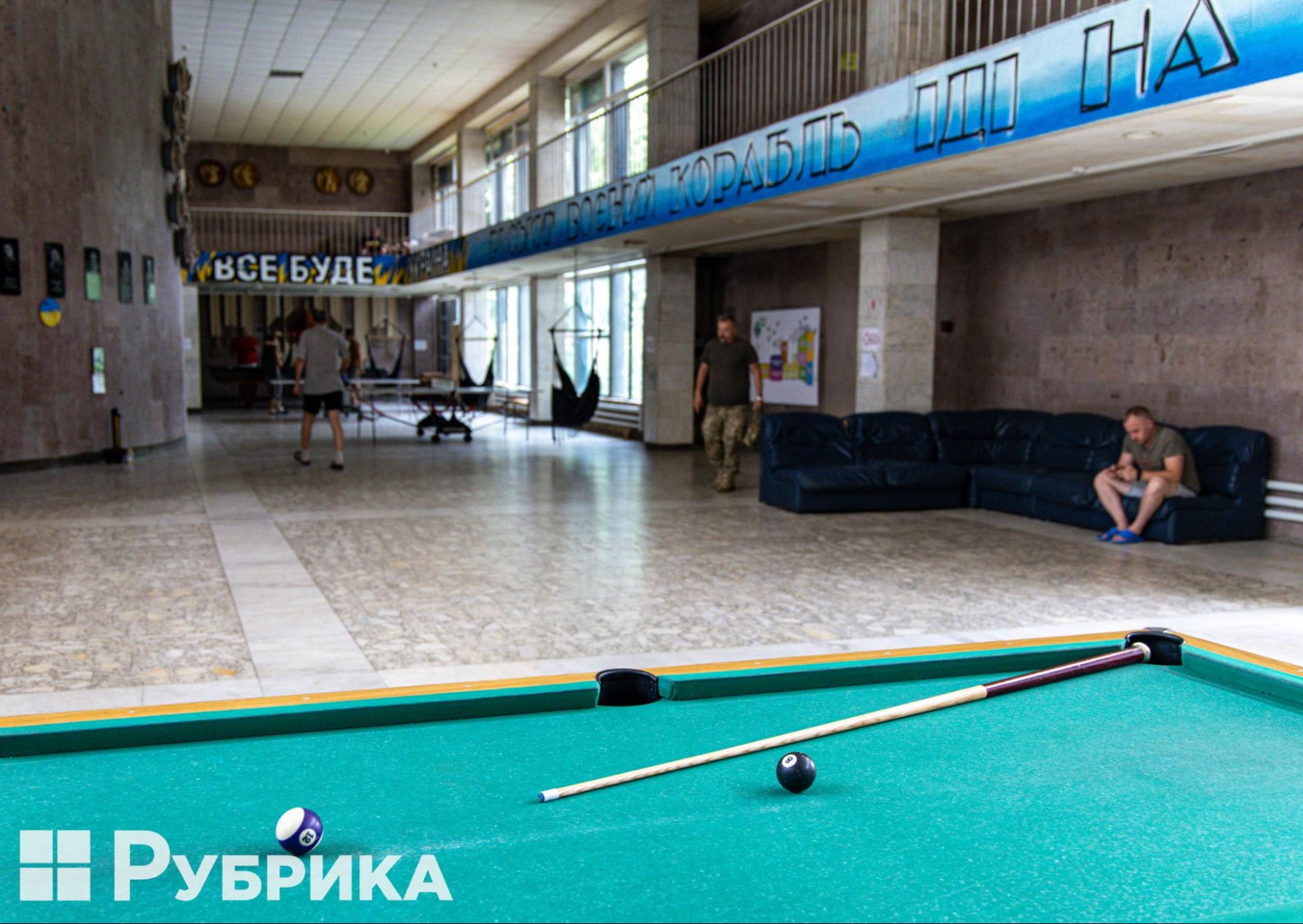
In the central hall of Lisova Polyana, soldiers can play billiards, table tennis, chess, and checkers
Soldiers come here by referral from hospitals or directly from the front by referral from unit commanders. In Lisova Polyana, soldiers are helped to recover from concussions and other traumatic war episodes.
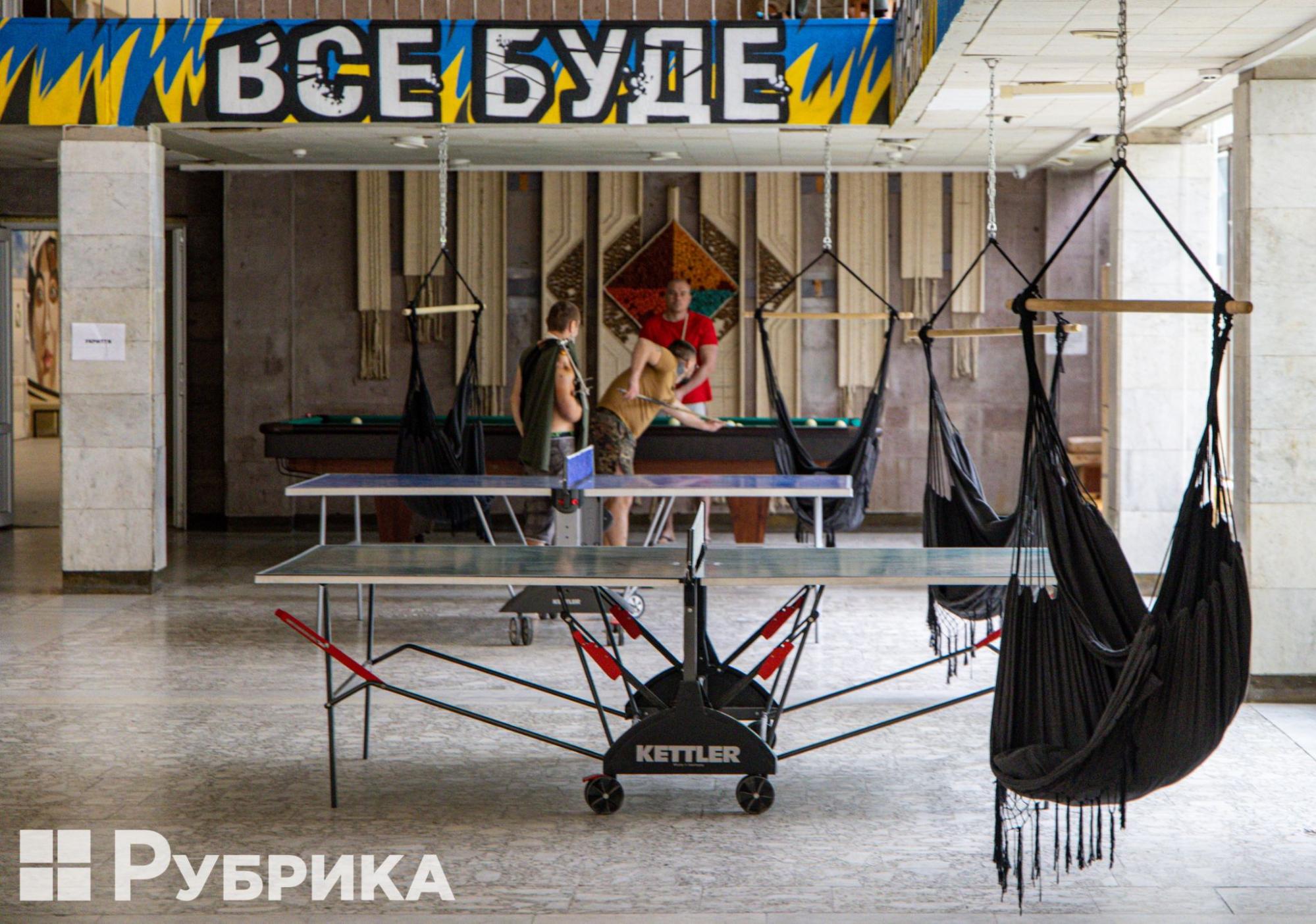
Recreation area in the central hall of the hospital.
"Trust and security are two fundamental things that our institution provides. First, such a supportive atmosphere is generally necessary for mental health. Secondly, it is necessary for the service members with whom we work. If a person feels trust, they will accept everything we offer them without hesitation," Ksenia Voznitsyna, the center director, is convinced. "This is our most important victory. All the methods we use are also achievements, but without the satisfaction of this primary need, nothing will happen at all."
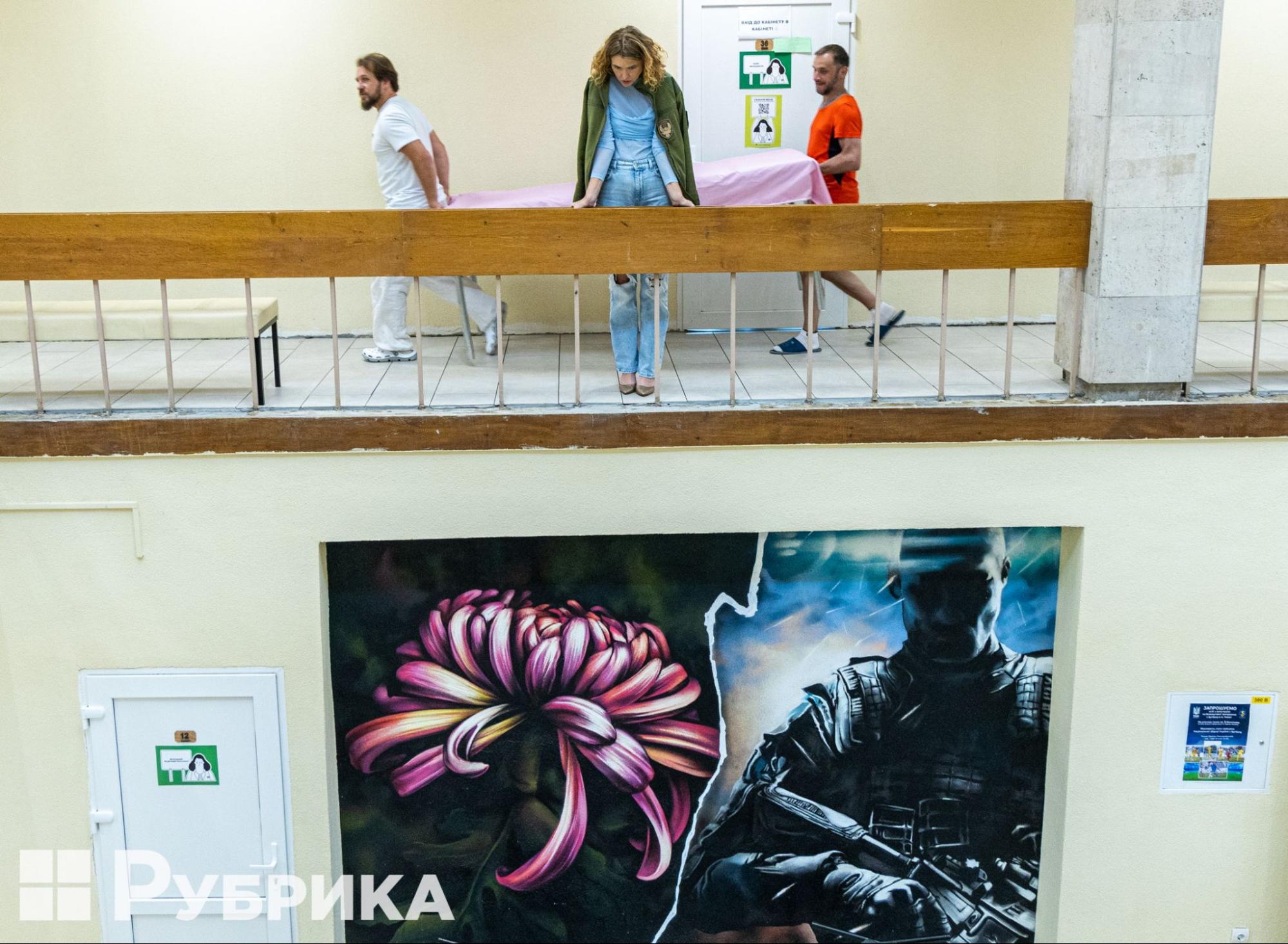
Director of the center, Ksenia Voznitsyna, on the second floor, where psychologists work, looks at the first floor, where the rehabilitation department is located.
That is why they work here with the entire team: doctors, psychologists, nurses, and paramedics, so communication with the military is as comfortable as possible.

Ksenia Voznitsyna talks to one of the veterans.
Whom does Lisova Polyana help?
The three main directions of the hospital are as follows:
- working with people who have received psycho traumas — that is, they have depressive, anxiety disorders, acute stress reaction, PTSD, adaptation disorders;
- work with people who survived captivity and torture;
- working with people with mild brain injury.
Actually, Voznitsyna herself is a neurologist by profession, and the latter is a topic of her professional interest.
After a mild brain injury, military personnel is admitted to the hospital, not in an acute but sub-acute condition. Medical treatment there is purely symptomatic — from headache, nausea if there are such complaints.
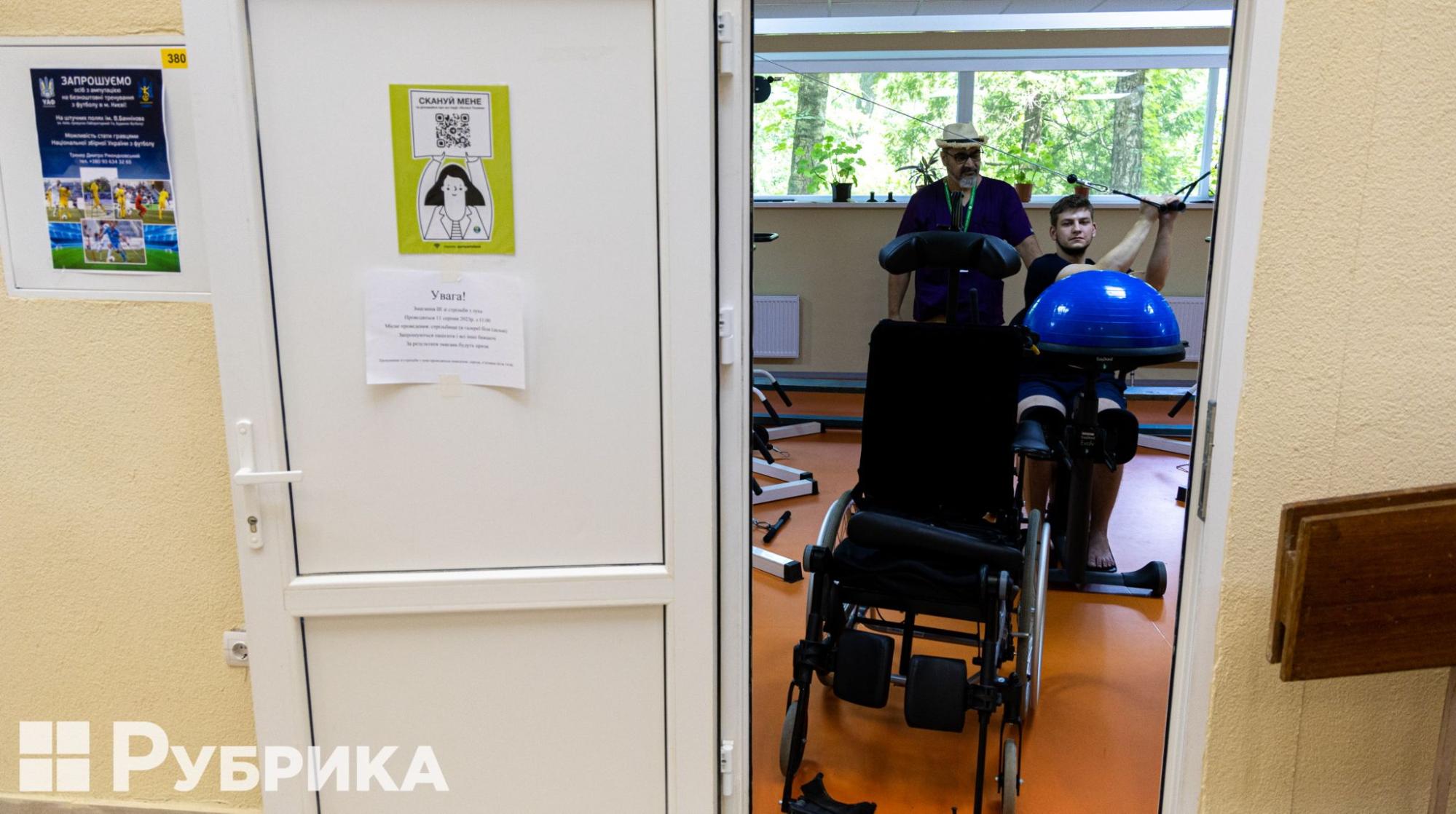
The center has its own Telegram channel (the scan code of which is on the left on the door), where announcements of all activities in the institution for the week and the day are published.
The center director emphasizes that IVs are not a proven treatment method. The brain can recover from this injury within seven days to a month, but not with IVs and pills, but with a particular regimen after the injury. It requires peace, quiet, good sleep and nutrition, some physical activity, and psychotherapy.
"Psychotherapy is essential for such an injury because a psychologist can provide certain education — skills, and understanding regarding lifestyle, help to improve sleep. This includes light physical activity with our physical therapists, acupuncture, and yoga," Voznitsyna lists.
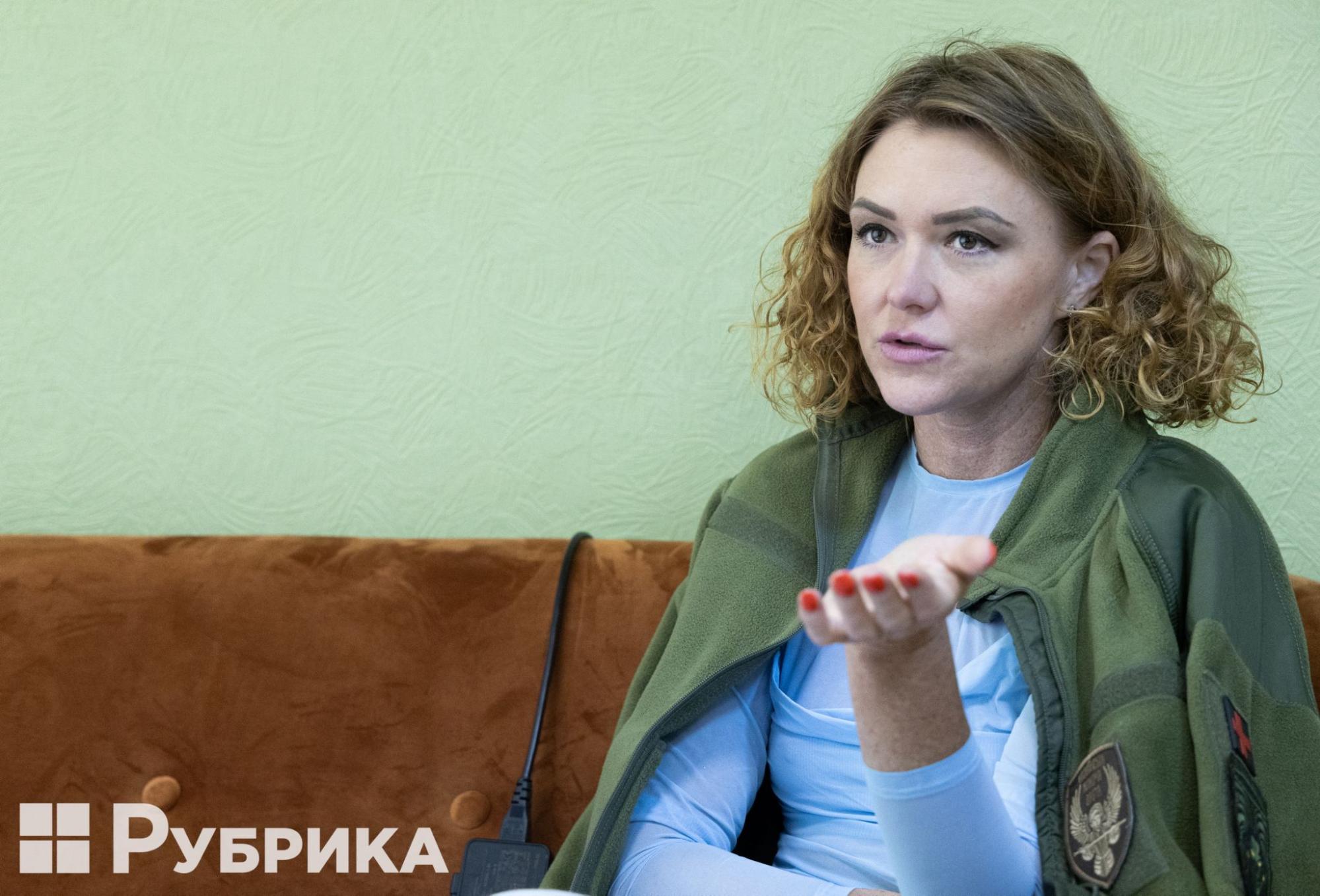
Director of the center, Ksenia Voznitsyna.
With such disorders, do not go to a psychiatrist
Why war injuries should be treated comprehensively
In general, the institution is designed for 220 patients, but there are 230 to 240 military personnel constantly rehabilitating there. Sometimes there is even a small queue, states the institution's director.
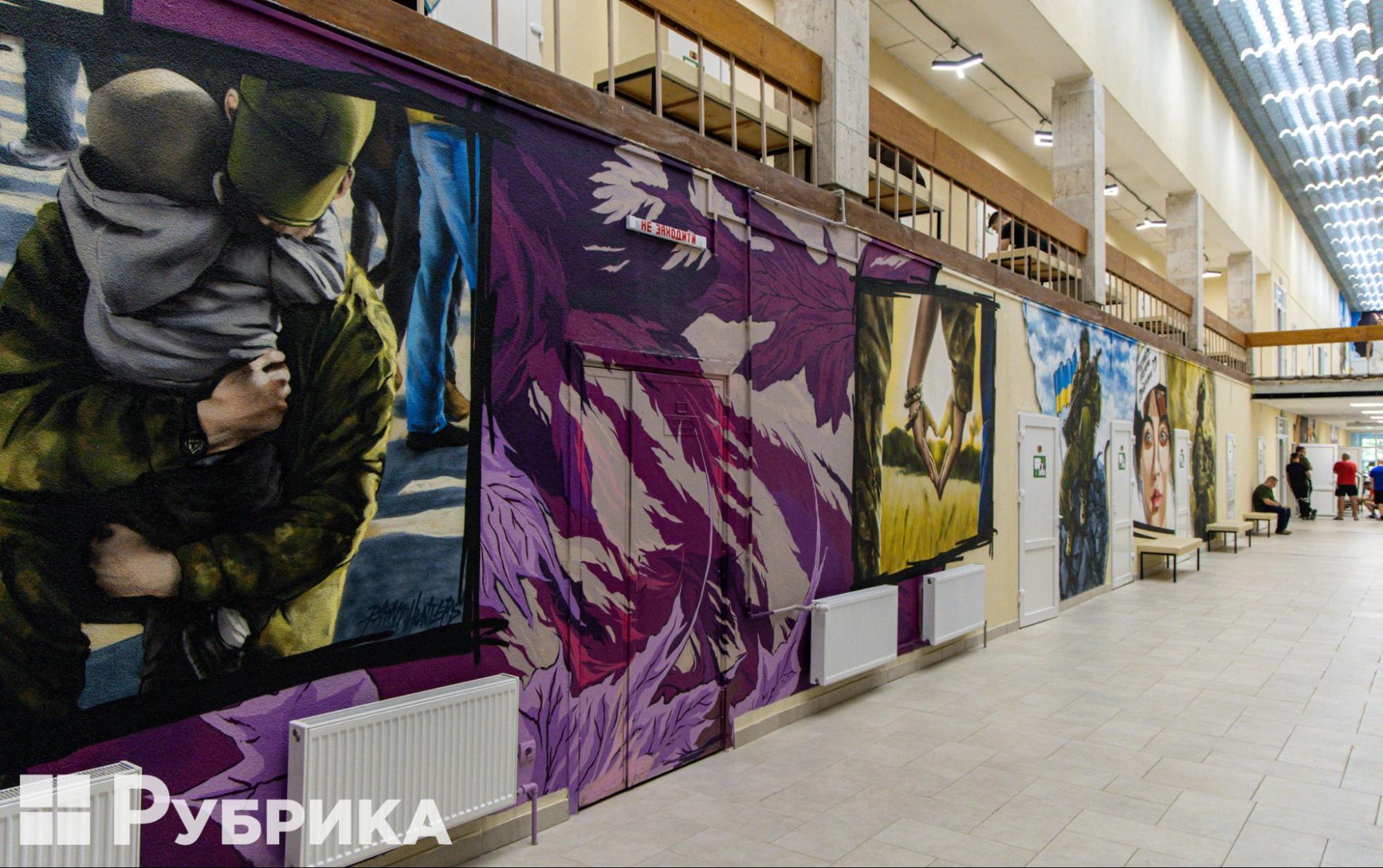
Volunteer artists realized the artistic decoration of the institution at the invitation of Ksenia Voznitsyna.

Exhibition of children's drawings in the central hall of the institution.
"Unfortunately, many people turn to psychiatric departments, but this is not an option in most cases. This is not an effective or adequate treatment," Voznitsyna assures. "Even though many disorders are purely of the psychiatric register according to the classification, these people should not be patients of psychiatric hospitals. There is a minimal list of services: there is a psychiatrist, there are drugs the patient uses, and that's it."
A much wider range of services is needed because it is not an endogenous psychiatric illness like schizophrenia or bipolar disorder. This is a mental disorder due to trauma. It is acquired and can be cured. Therefore, the principle of work is completely different.
She emphasizes that it is essential to maintain a comprehensive approach to the recovery of the military. In particular, this is how the biopsychosocial model works when there is work with the body, psyche, and social component.
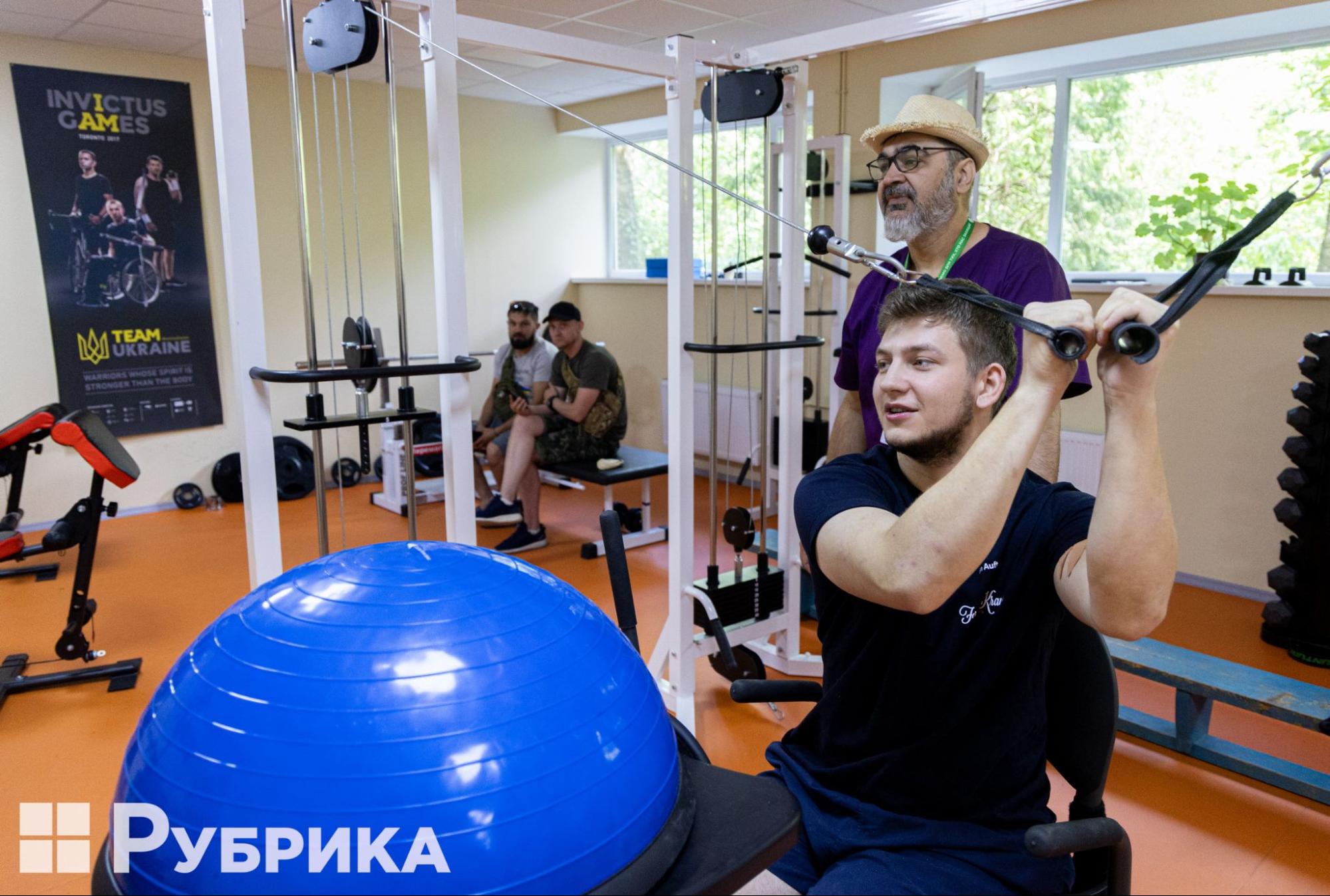
Physical therapist Mykola Terets selects a set of loads for a veteran.
It will not be possible to overcome a mental disorder only with the help of a psychologist or a psychiatrist, the director of Lisova Polyana is convinced. It is necessary to add physical rehabilitation and many social components — for this, there is a social worker here.
The recreational component, when professional medical activities are added to those that properly form leisure time, is necessary. When there is free time, it can be a game of pétanque, additional meetings with different people, watching movies, or specialized games for cognitive development. The whole day of a person staying in an institution is occupied with various activities.
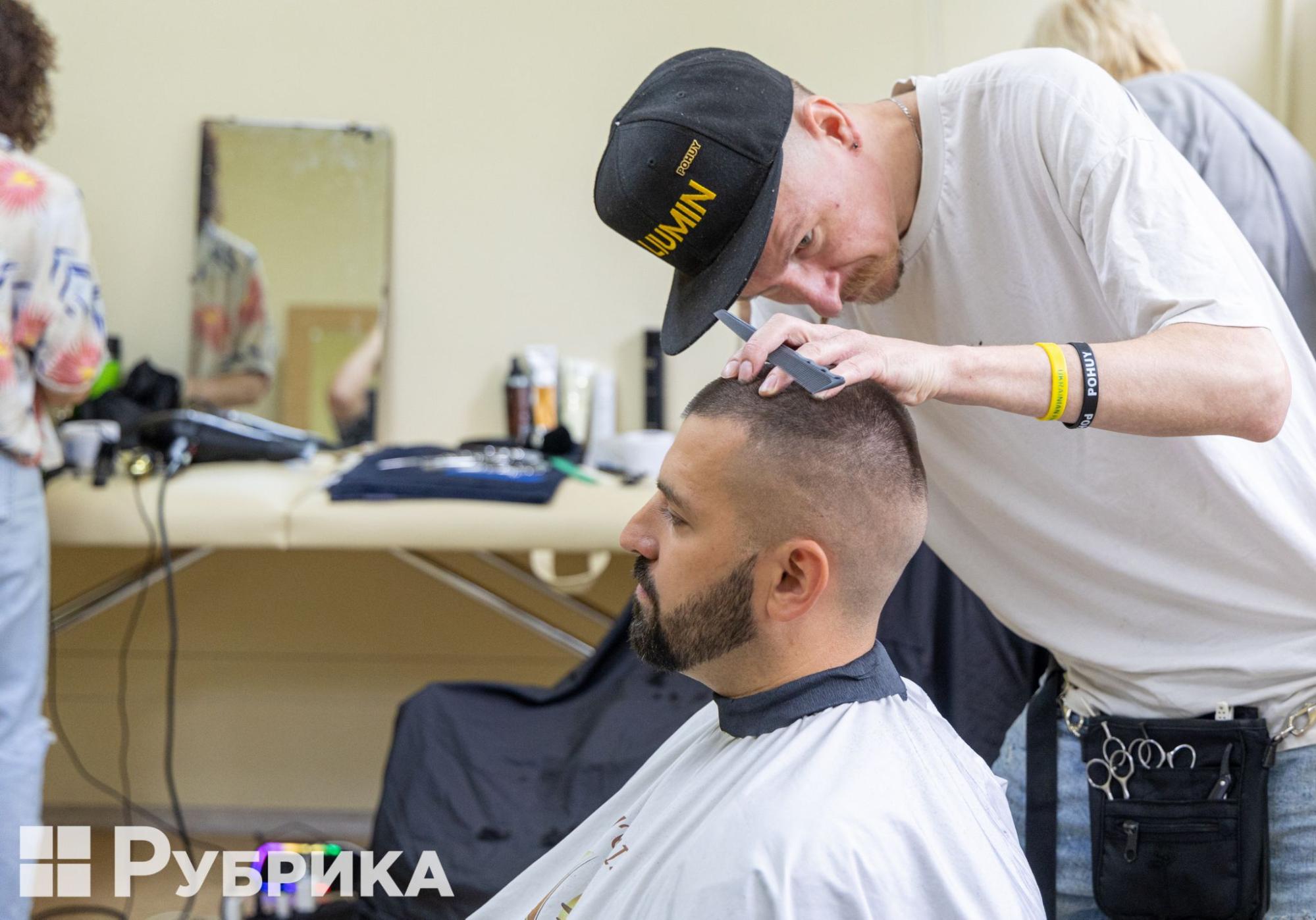
Volunteers come to the Center every Thursday, and a free barbershop is open for veterans.
For the most part, military personnel stay here for 21 days, the minimum period for a person to recover, says Voznitsyna.
Universal assistant
How a clinical case manager works
"We do not have such a position in the staffing lists of hospitals or professions. However, they work in all veteran institutions in the US, in many institutions where people recover their mental health," says the director of Lisova Polyana. "A clinical case manager is an assistant for the institution's specialists and the person themself. They help the person understand how everything is arranged here, where the services are provided, and what the personal treatment schedule is."
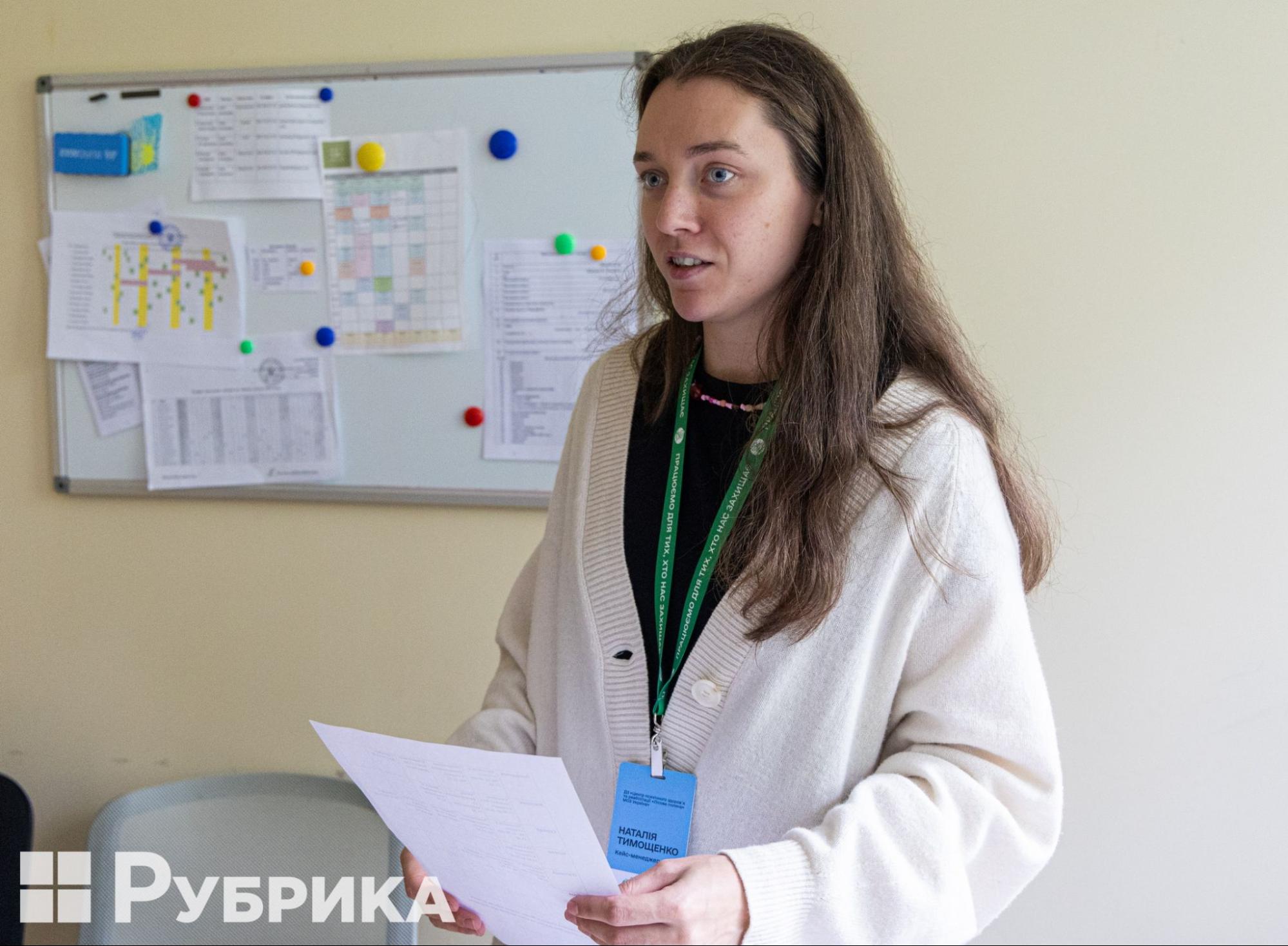
Case manager Nataliia Tymoshchenko.
Lisova Polyana currently has five case managers. When we arrived at the facility, one of them, Nataliia Tymoshchenko, was conducting an introductory tour for a newly arrived soldier. The two of them walked around the institution's territory; the soldier got the manager's phone number and permission to bother her about all medical and household issues.
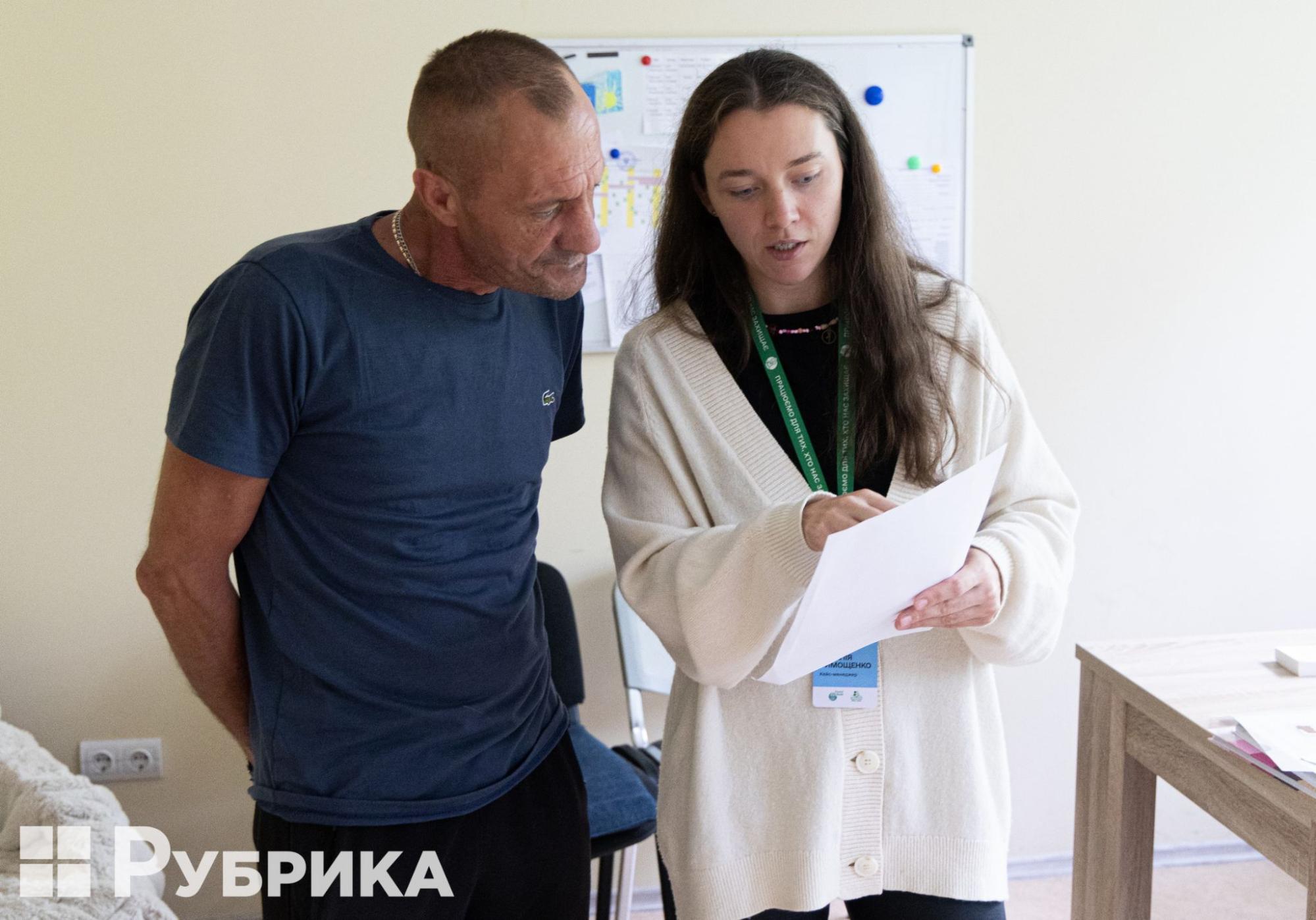
Nataliia Tymoshchenko explains his schedule of consultations and procedures to the newly arrived veteran.
Case managers are trained as psychologists or social workers, and it is difficult for the team to imagine their work without them. After all, people who enter the institution often have impaired cognitive functions due to injuries: memory, concentration, and attention. They may forget something, or go to the wrong office — people released from captivity sometimes lose track of time. The case manager provides such organizational support.
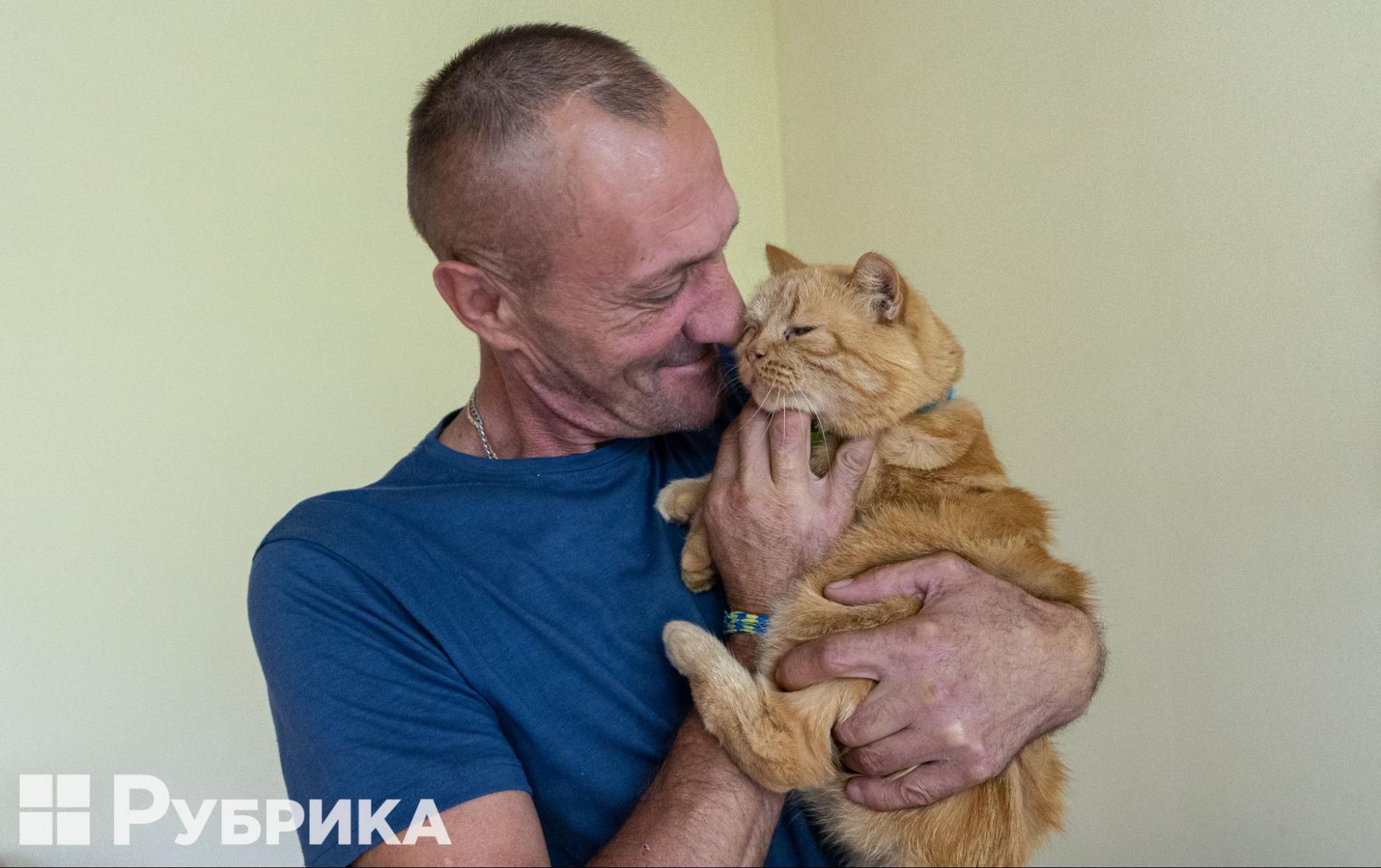
The newly arrived soldier gets to know not only the institution's specialists but also the cat therapist Ruta. The director of the center brought her from Dnipro, abandoned or lost by the previous owners.
This position is not yet permanent. It was implemented thanks to the grant support of the Renaissance Foundation. Unfortunately, the project lasts only six months, so Lisova Polyana will seek support to continue this practice.
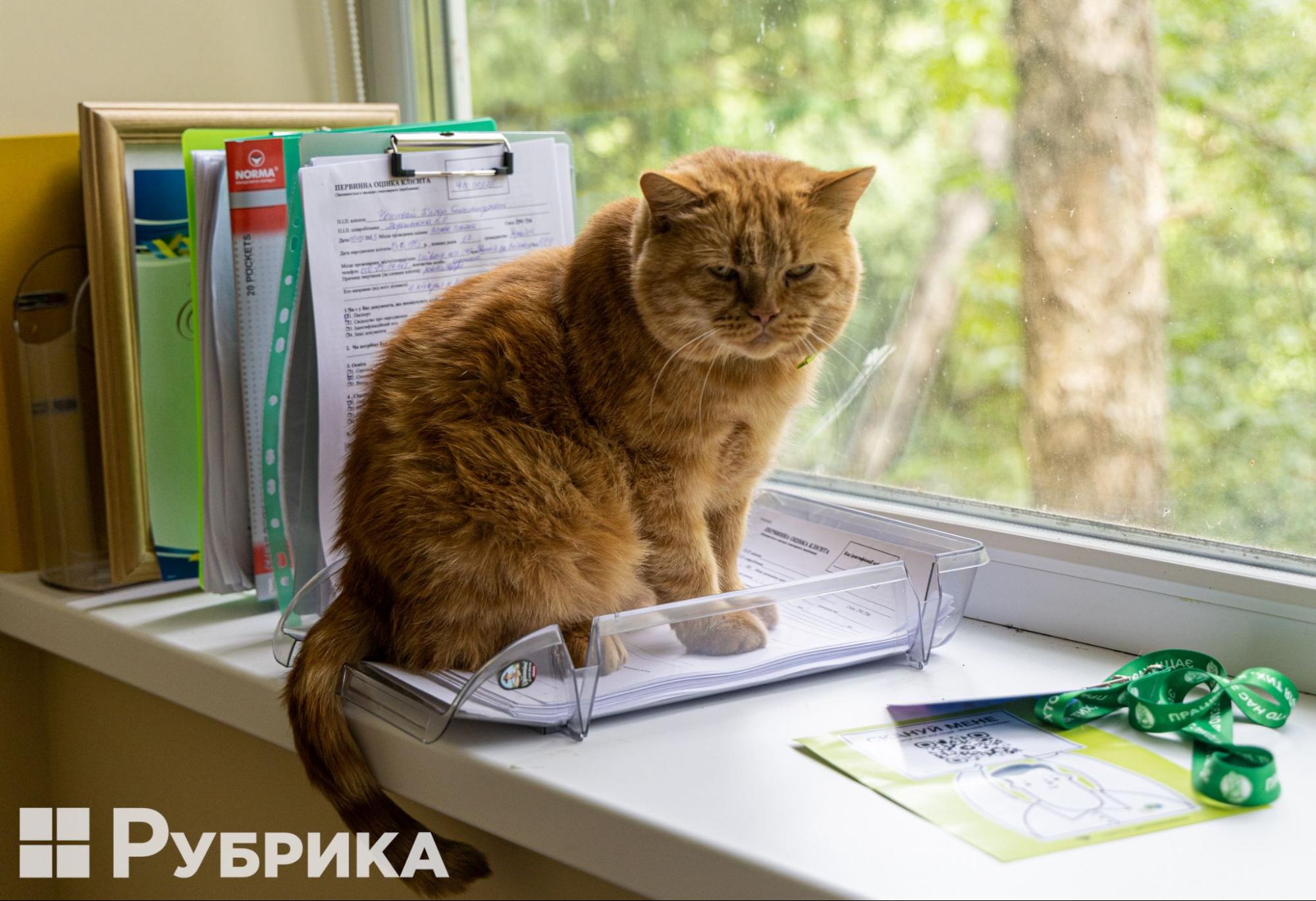
Cat therapist Ruta has a personality and can bite, but it does not refuse to walk with the soldiers outside on a leash.
How does a clinical psychologist work?
"I do not heroize and do not treat the warrior as a victim"
When we enter the office of clinical psychologist Dana Murzova, she unpacks the artistic frames:
"Patients drew me pictures, I bought frames, I will hang them here," she explains.
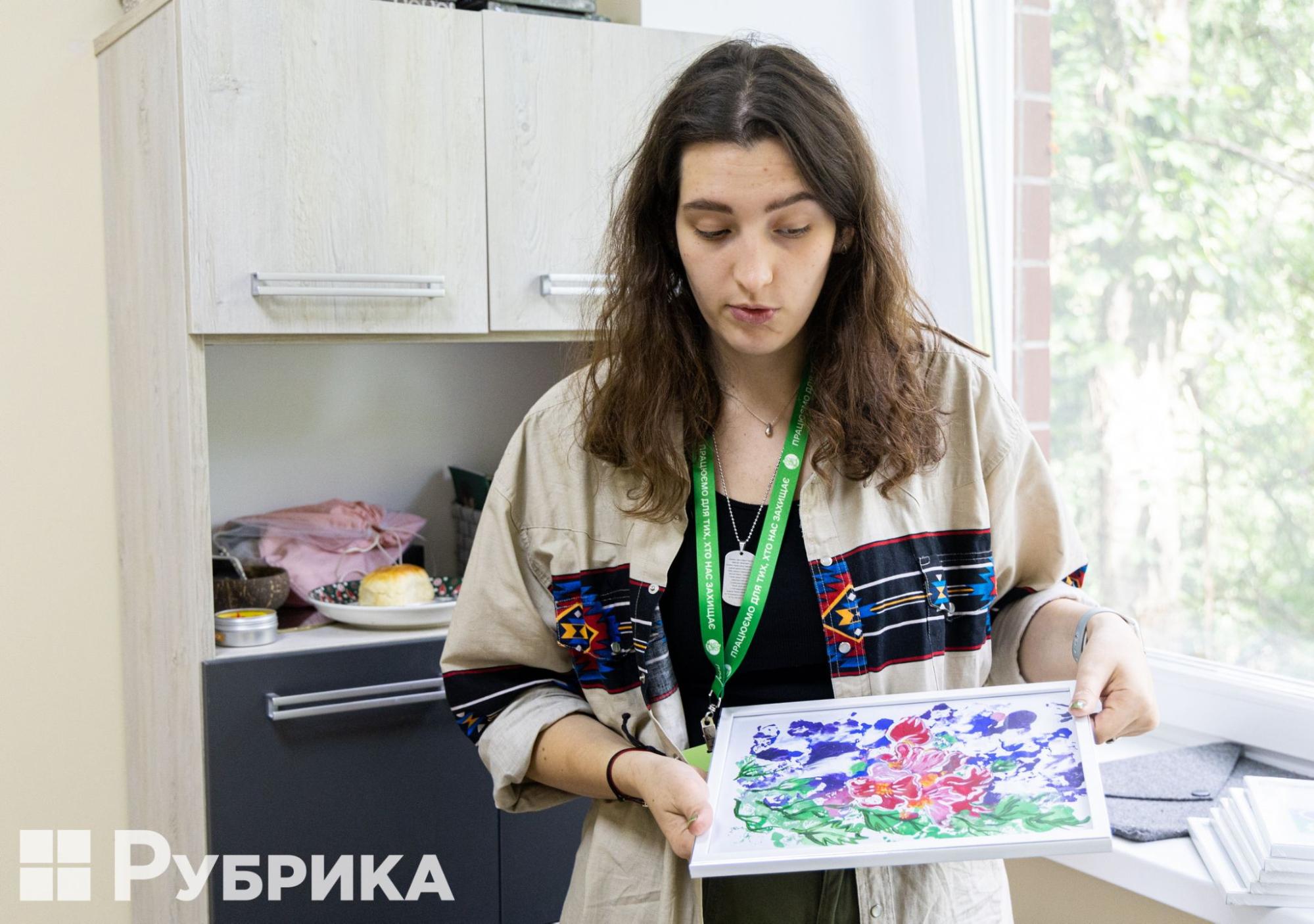
Clinical psychologist Dana Murzova with a picture of a veteran.
There are already up to a dozen paintings on one of the office's walls. The soldiers can draw in consultation to discuss their plot later and individually in their free time. The psychologist provides the materials.
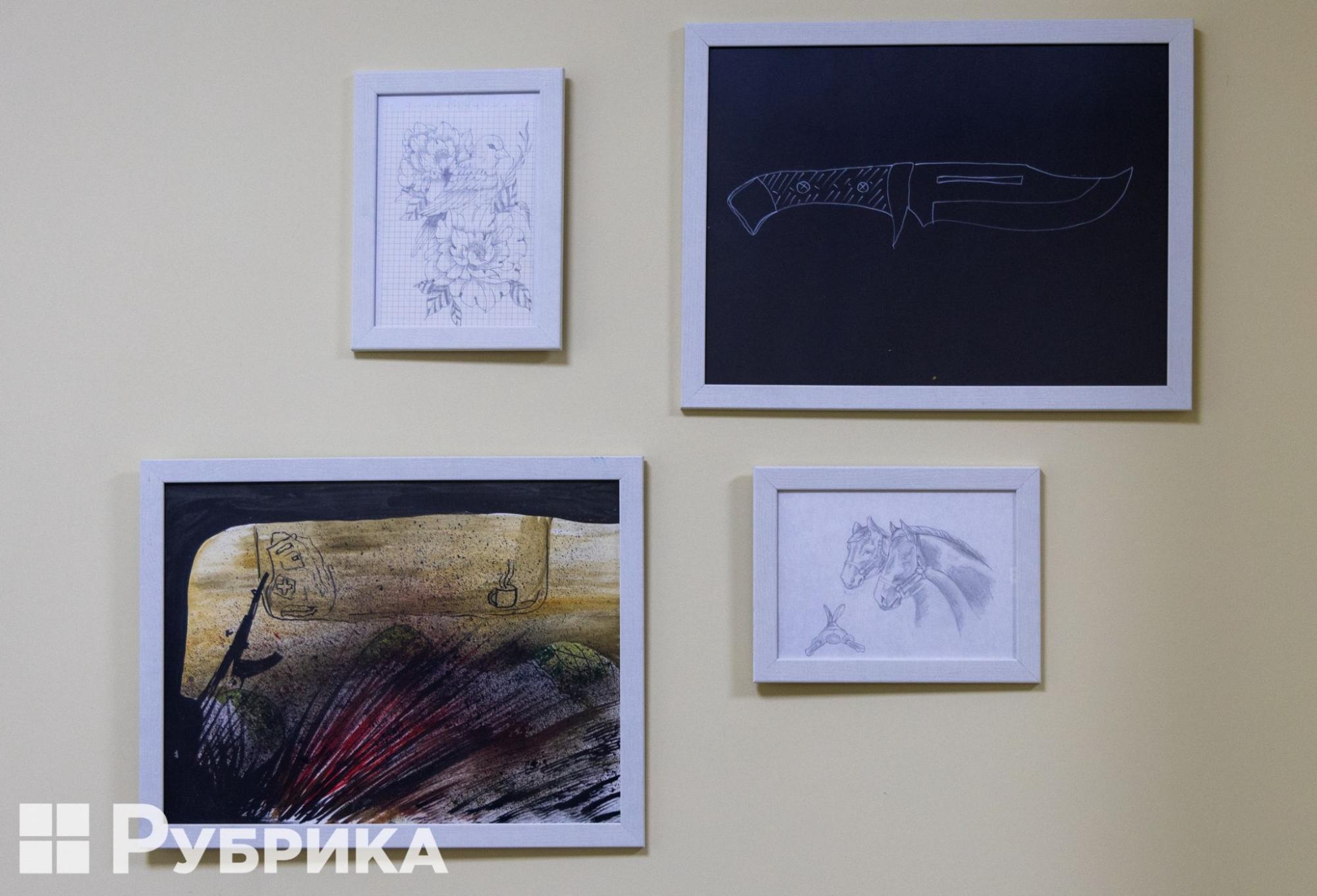
Pictures of soldiers on the wall of the psychologist's office.

Part of the interior of clinical psychologist Dana Murzova's office.
When conducting a consultation, the psychologist always thanks the person for the service. She moved here to work from Ivano-Frankivsk because she wanted to work specifically with the military. Currently, the specialist works with soldiers who survived captivity and torture.
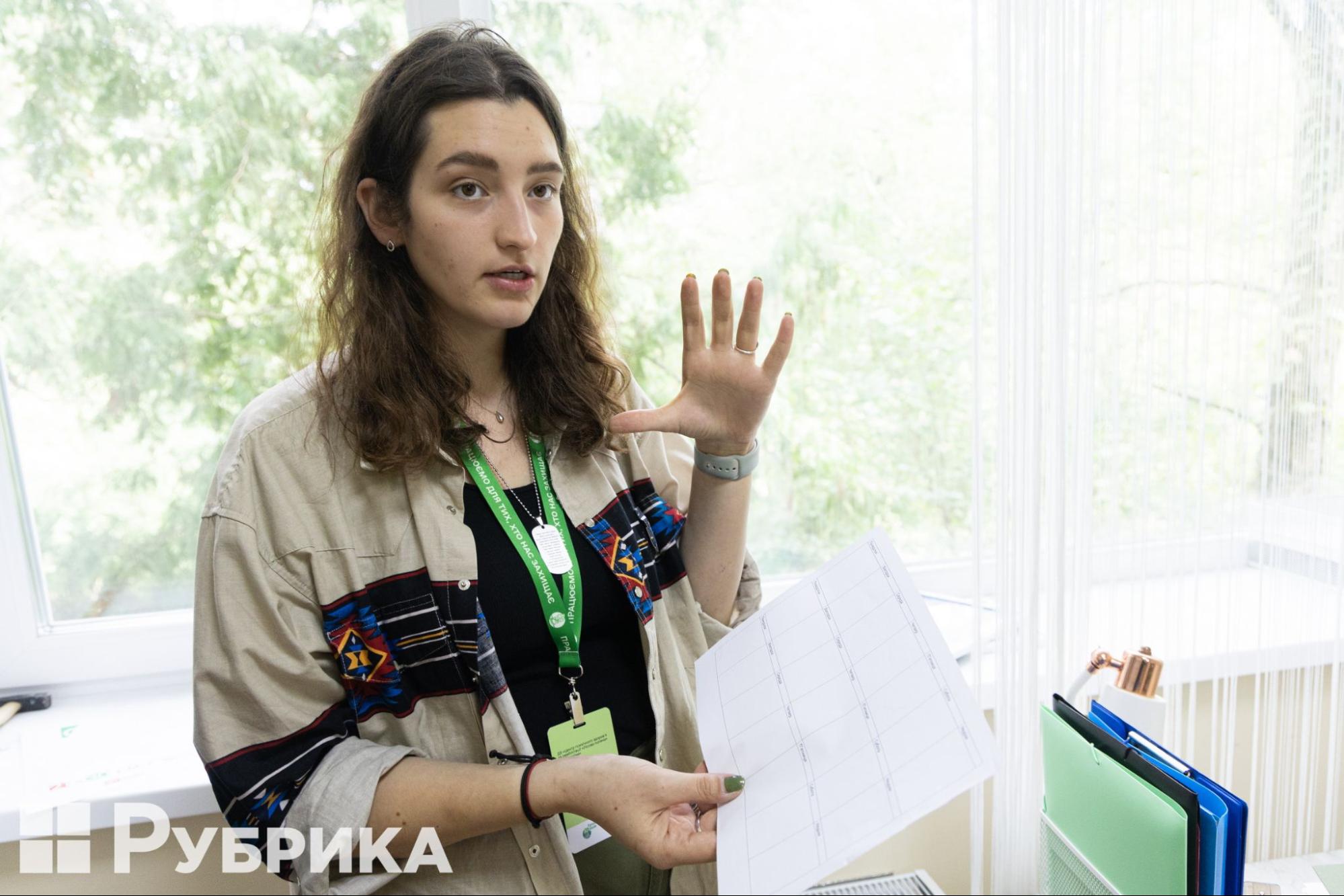
Clinical psychologist Dana Murzova shows a schedule that she fills out for each veteran
"I have great respect for the people who protect us. I work first of all with the person and then with the diagnosis. I try not to infantilize patients and do not heroize them. They have done and are doing a lot that is very valuable for all of us, but being a hero 24/7 is very difficult, they say it themselves."
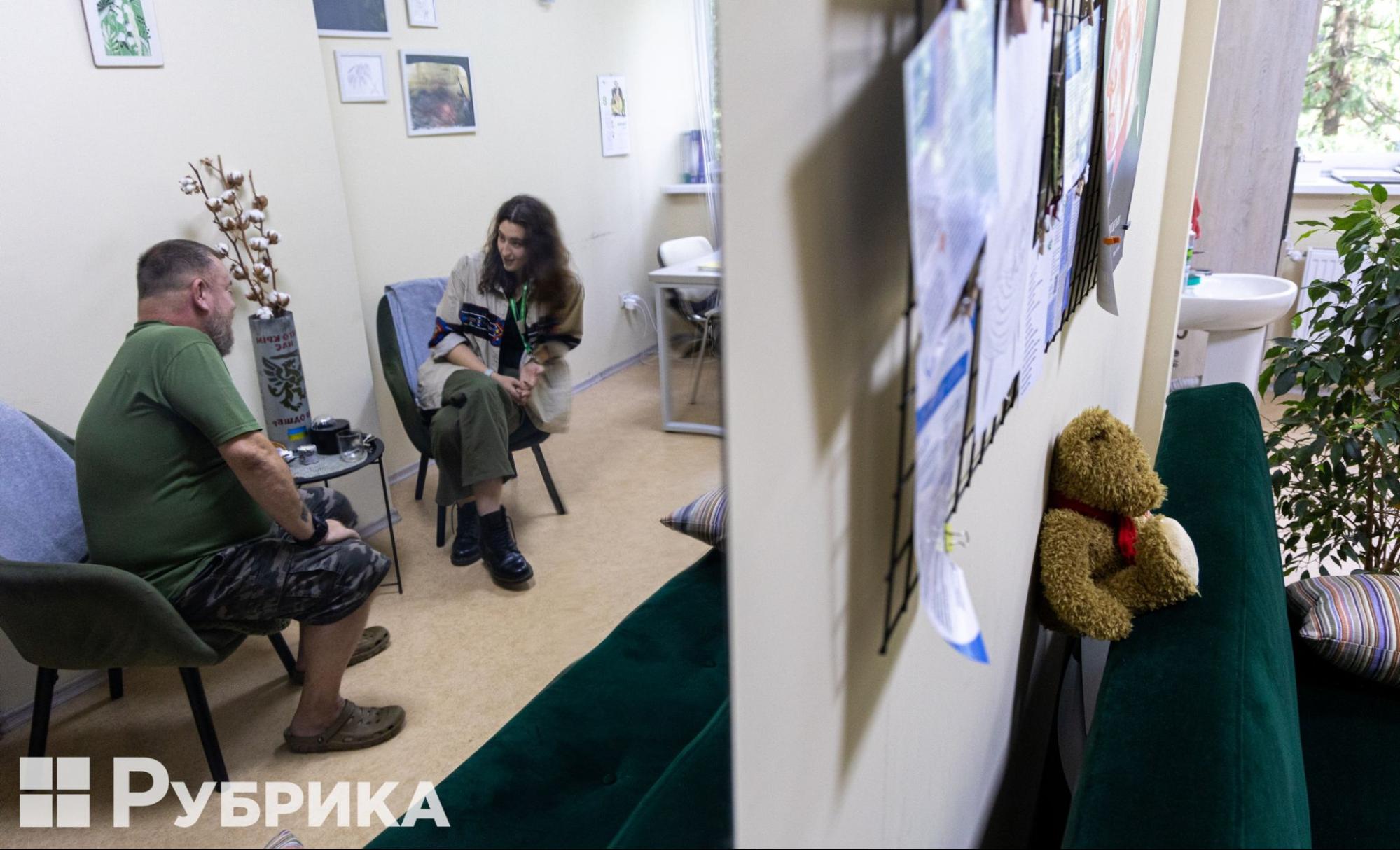
Dana Murzova talks to one of the soldiers in her office.
Consultations are arranged several times a week, lasting approximately one hour. Sometimes metaphorical maps designed by a Ukrainian artist specifically for psychologists help find the right conversation topic. If a person feels excessive aggression, a ball that can be hit comes in handy.
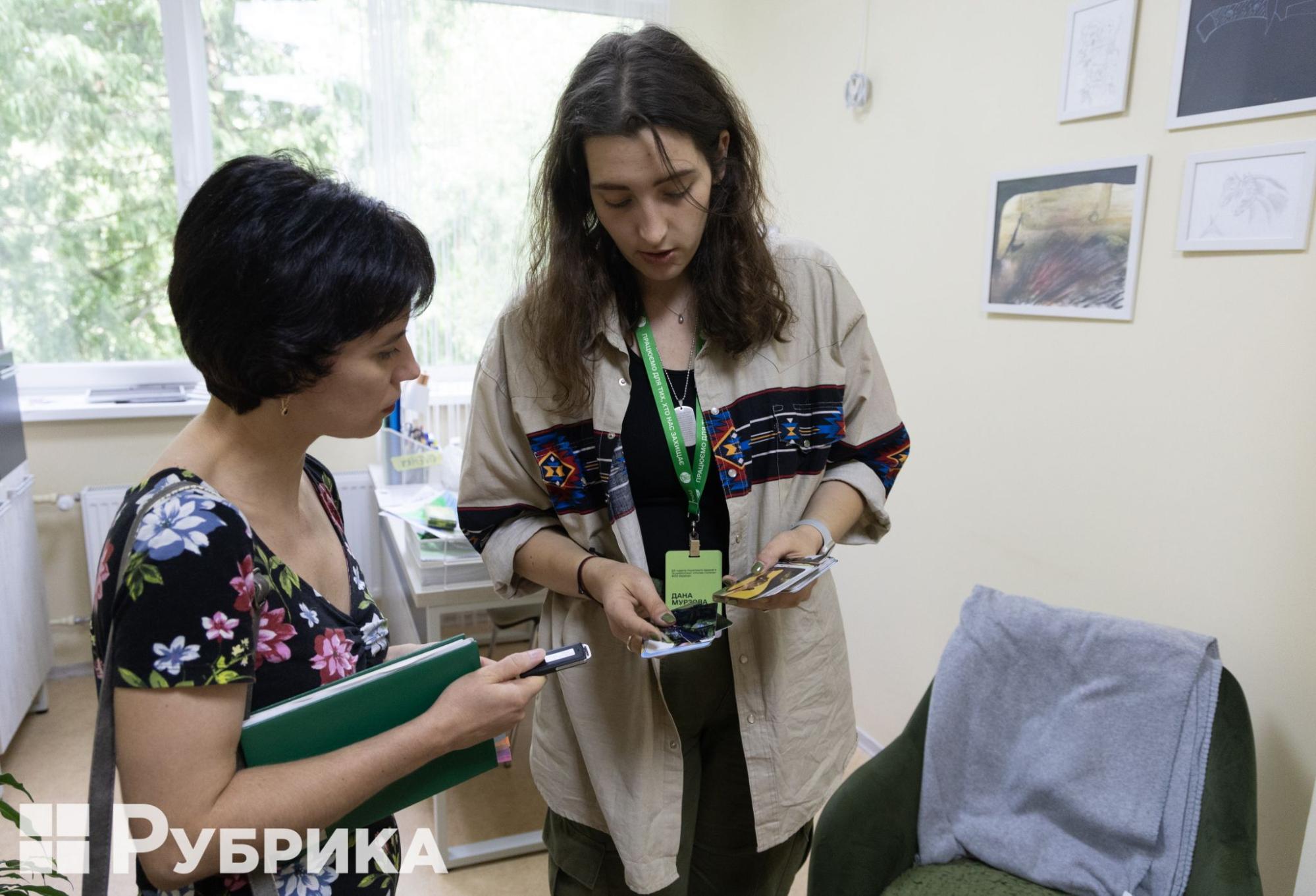
Psychologist Dana Murzova (right) shows metaphorical maps that help start a conversation with a patient.
What new psychological methods work here
In Lisova Polyana, they use diagnostic and psycho-corrective methods that have already been tested in the world but are the latest for Ukraine.
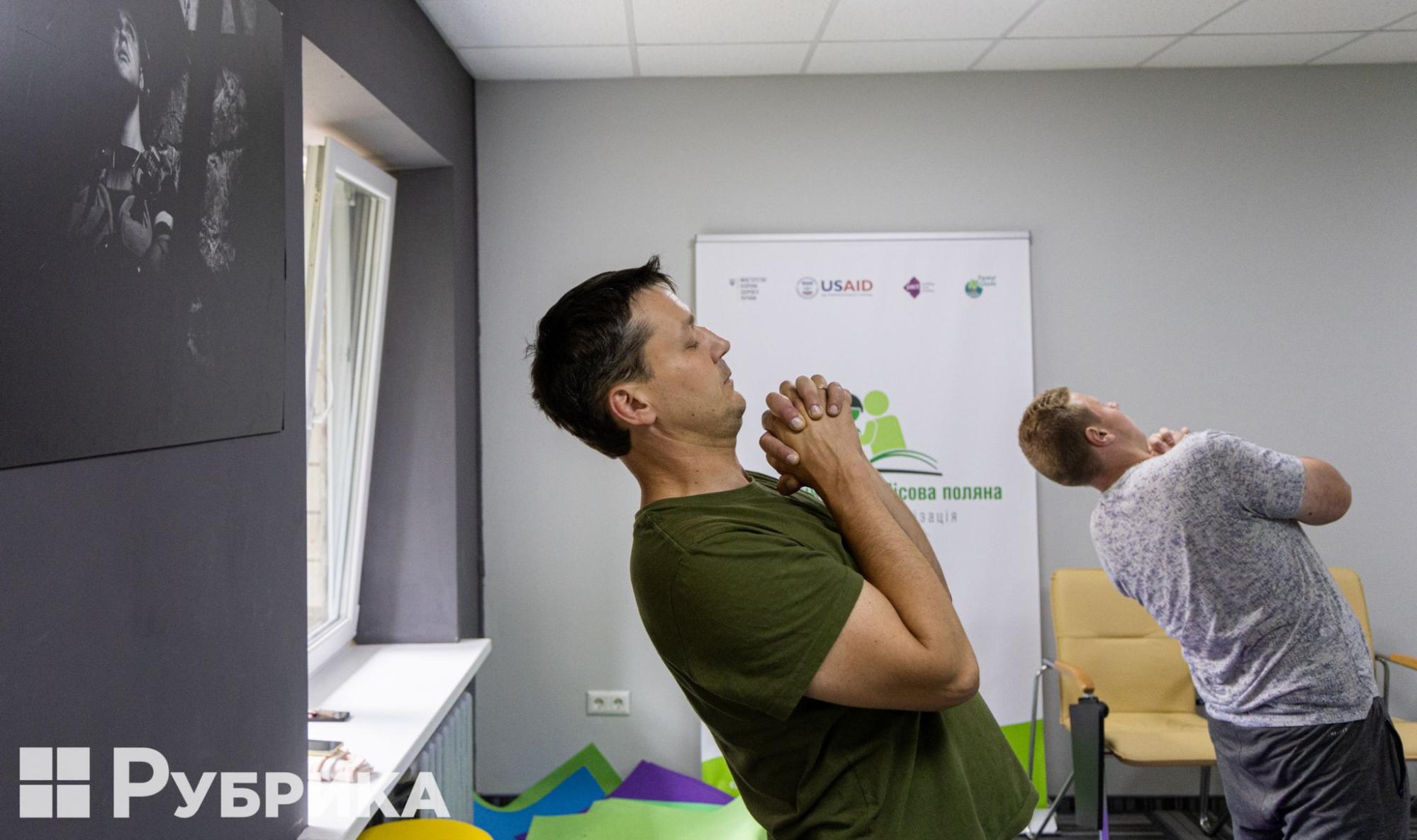
Physical education classes in Narnia — a separate space for relaxation activities.
One such method is the method of narrative exposure therapy. It was designed for war-torn countries: where resources are scarce, and people have experienced multiple traumatic events. The method helps people alleviate PTSD symptoms and, at the same time, is a means of recording evidence for future trials.
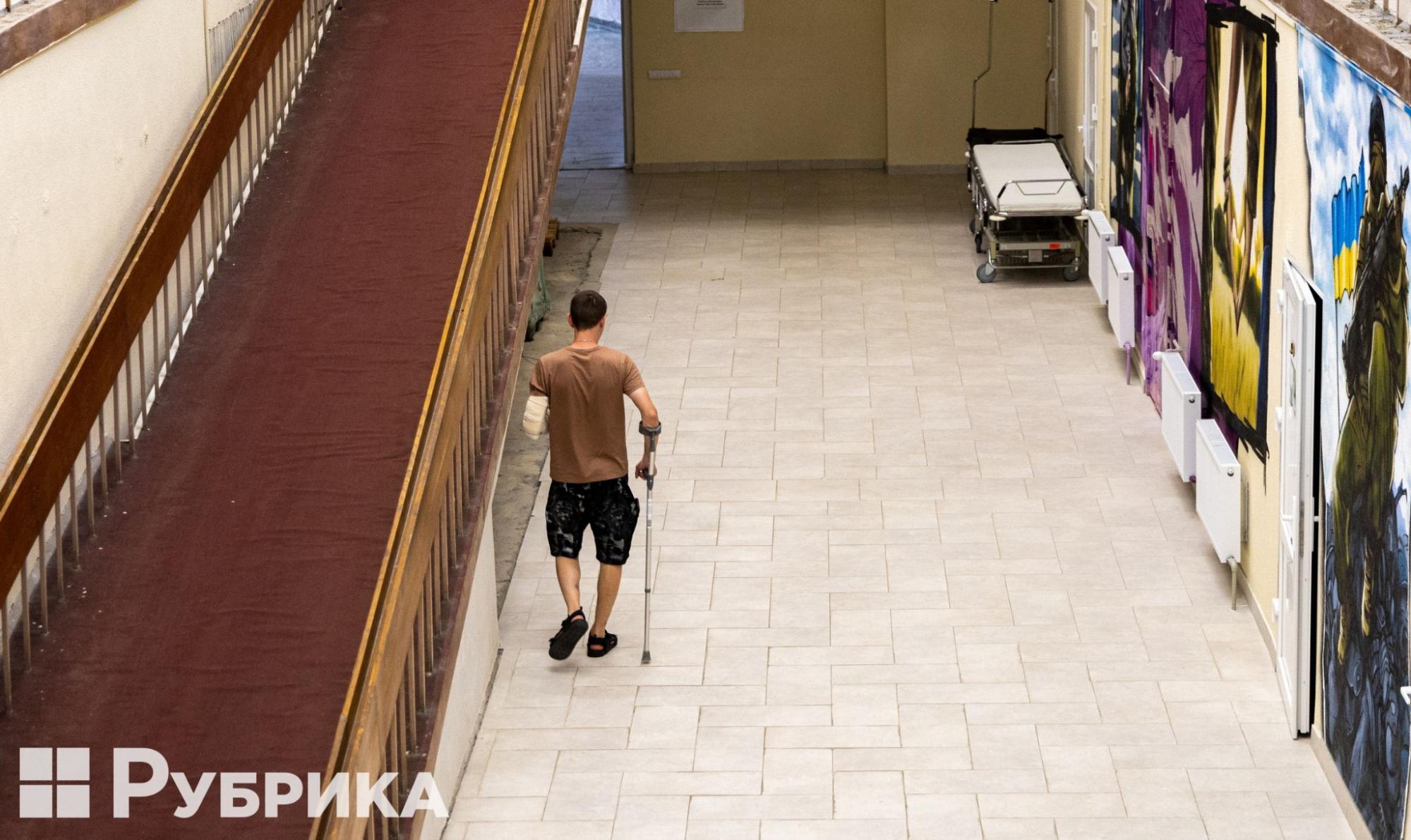
Large-scale renovations are planned at the facility next year at the expense of the World Bank.
Biosuggestion techniques are also used here to influence psychosomatic disorders. It combines the methods of verbal and non-verbal suggestion in a light trance state. It helps relieve internal tension and fatigue and helps with insomnia, headaches, and other symptoms.
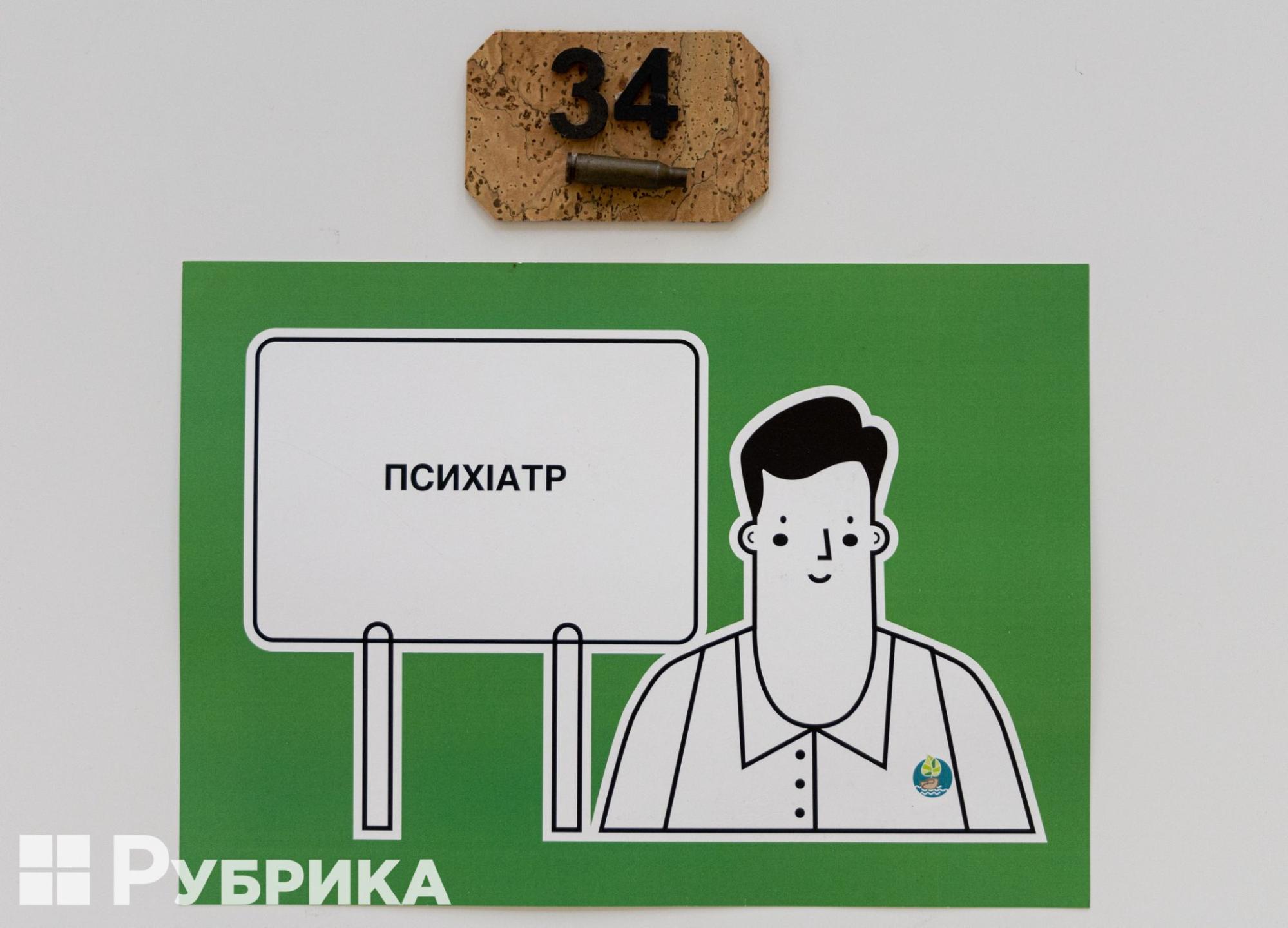
Welcome signs hang in all offices.
As a diagnostic method here, eye-tracking is used — the technique of determining a person's condition by eye-tracking. Voznitsyna says this method is used in addition to questionnaires filled out by a person who has come for rehabilitation.
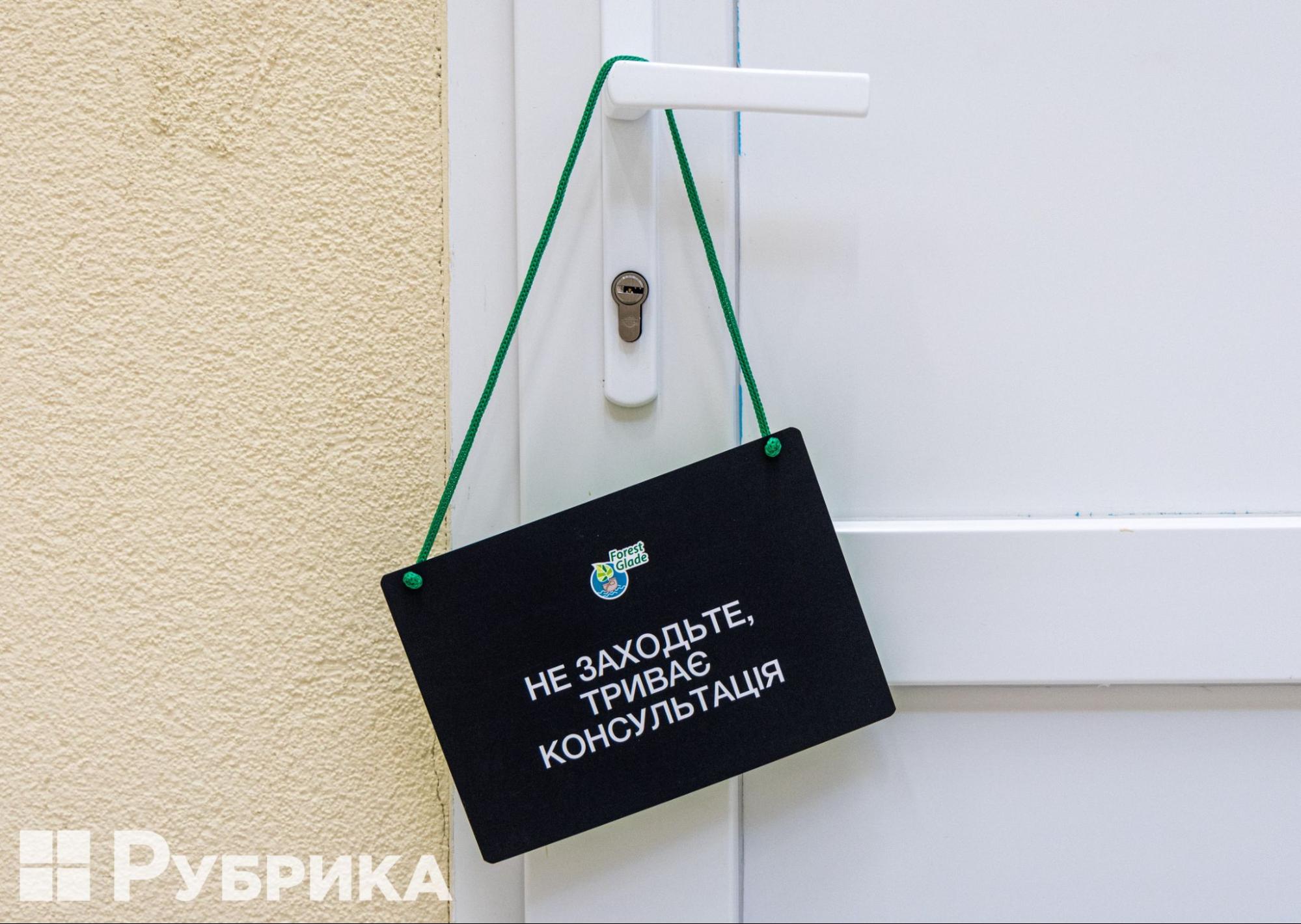
A sign on the door of the office of one of the psychologists.
The ANIMA company developed the method. It helps to determine anxiety and certain depressive states by the patient's eye movements, which are read and analyzed by a computer program.
How neurofeedback works
The main task is to relax
Neurofeedback is one of the newest auxiliary methods for Ukraine, which is used in Lisova Polyana. It looks like a computer game. Only you need to control it not with your hands through the keys but with your brain by regulating your condition.
Psychologist Olena Seleznyova, who works on this program, explains: special sensors are placed on a person's forehead or back of the head through a bandage, which read brain signals: "Sensors are installed on the back of the head or the forehead. In this way, you can work with alpha and beta waves, that is, with concentration and relaxation. We work more with beta waves than alpha — we install sensors on the forehead. After all, the military knows how to concentrate very quickly. We work harder to keep them cool in stressful situations so they don't find themselves in an emotional stupor or get lost."
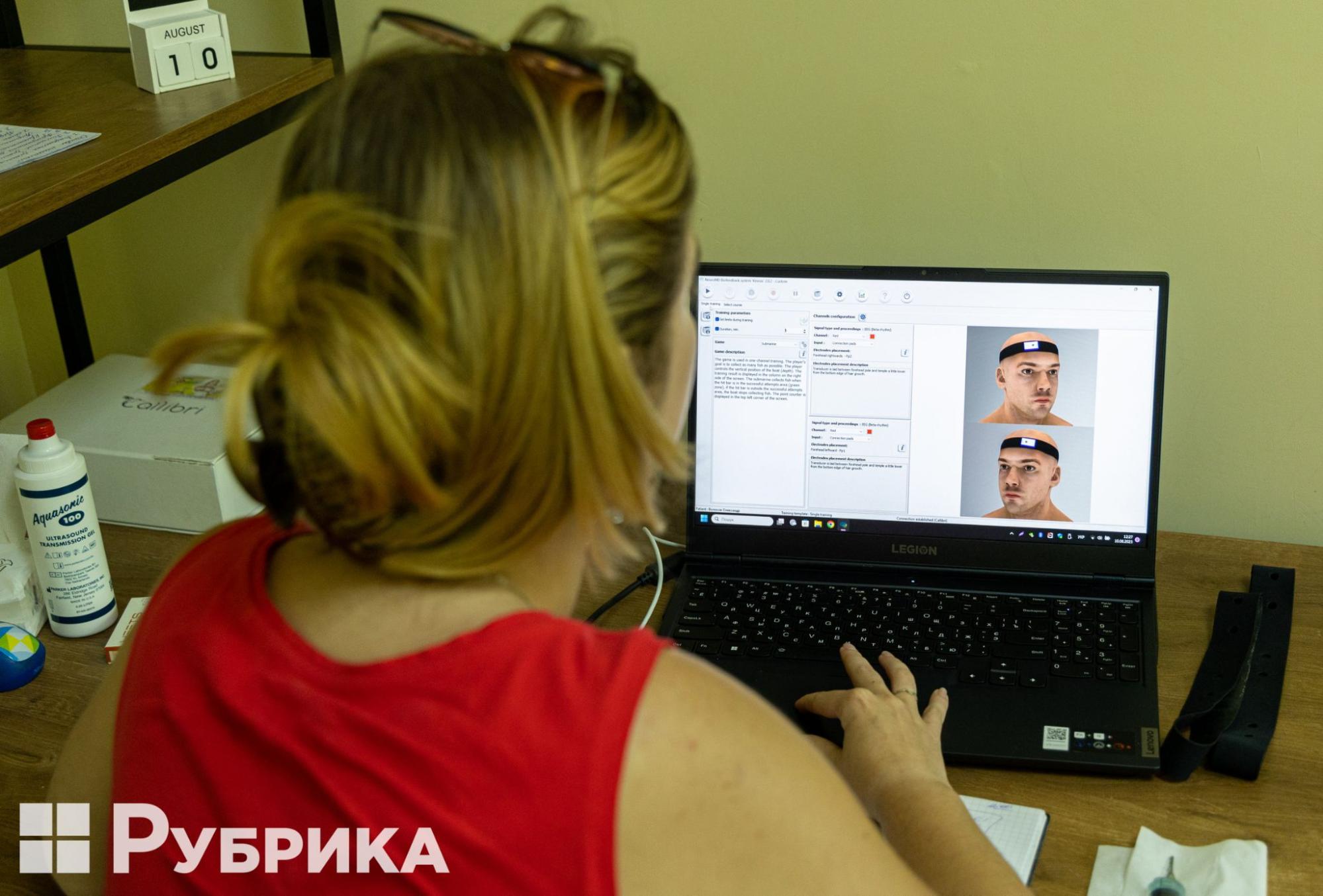
Psychologist Olena Seleznyova shows how neurofeedback works.
When sensors are installed, games are enabled. It can be a pond in which you have to find nine coins. The difficulty is that the transparency of the water in the pond changes depending on the person's state. Or, for example, it is a submarine that must be guided over mines.
"A person essentially sees their condition on the screen. If it changes, the picture on the screen also changes. If a person has emotional troubles, the submarine will follow a sine wave (a specific wave, ed.). That is, a person is emotionally unstable in a certain way. If a person is closed in themselves, the boat begins to sink. A person sees this and tries to do something about it. When a person has relaxed, through breathing or otherwise, the submarine goes up again," explains the psychologist.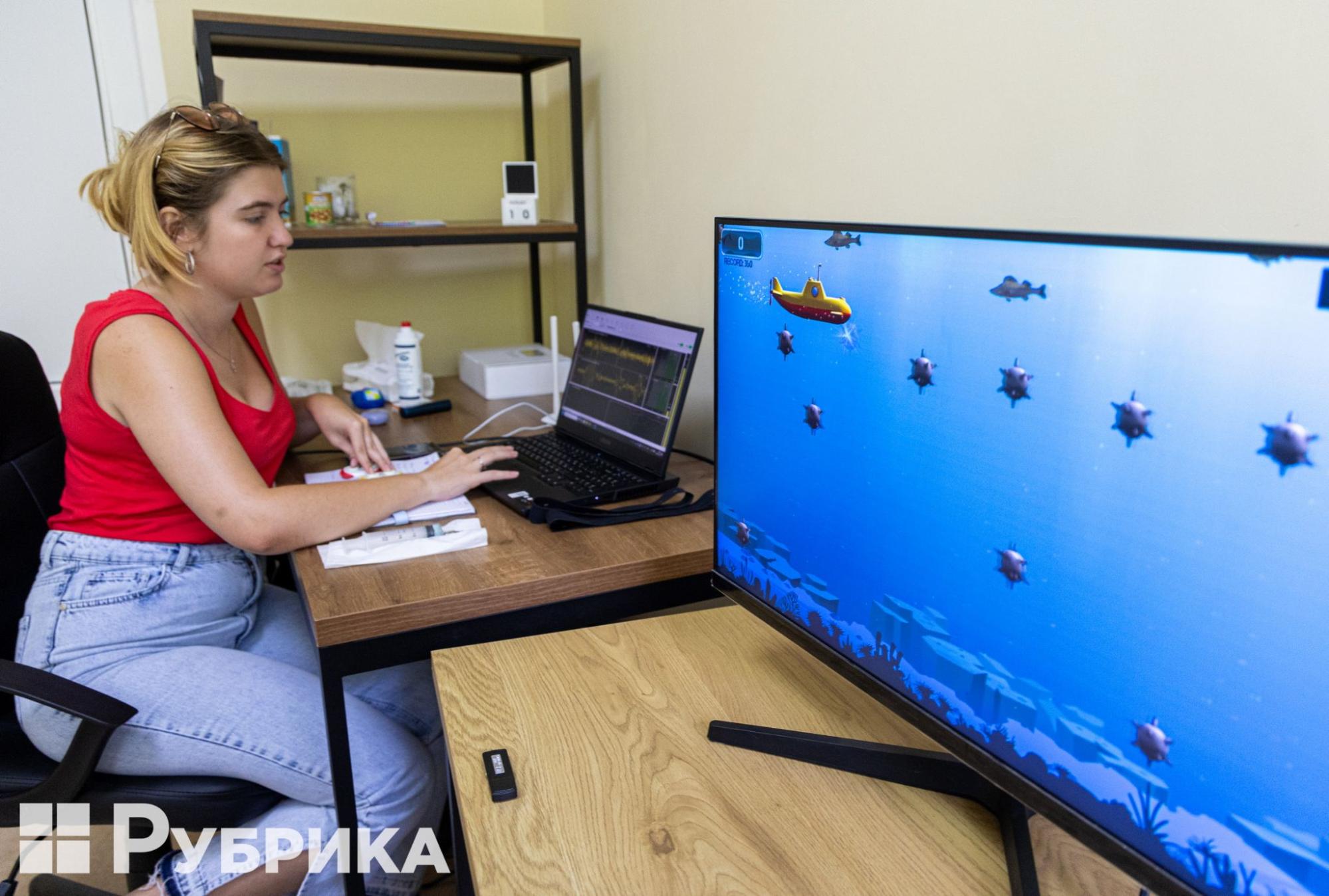 The task of the military during the game is to keep the submarine above the level of mines. They succeed if the person is calm and relaxed.
The task of the military during the game is to keep the submarine above the level of mines. They succeed if the person is calm and relaxed.
Seleznyova says that she sets up patients to perceive this technique as a game because they came for rehabilitation, so they don't have to stress.
The technique allows you to see how a person can relax better: through a visual or auditory channel. Depending on the person's feelings, you can remove the sound of the game or play with your eyes closed.
Usually, the session lasts about half an hour. Games are activated for five minutes each.
"For 15 minutes, they play the games, and for 15 minutes, they just talk to me. I don't talk to military people about their diagnoses as much as their lives. I ask who they were before the war, their family, and other life-related questions. I always shake their hands and thank them for their work," Seleznyova says.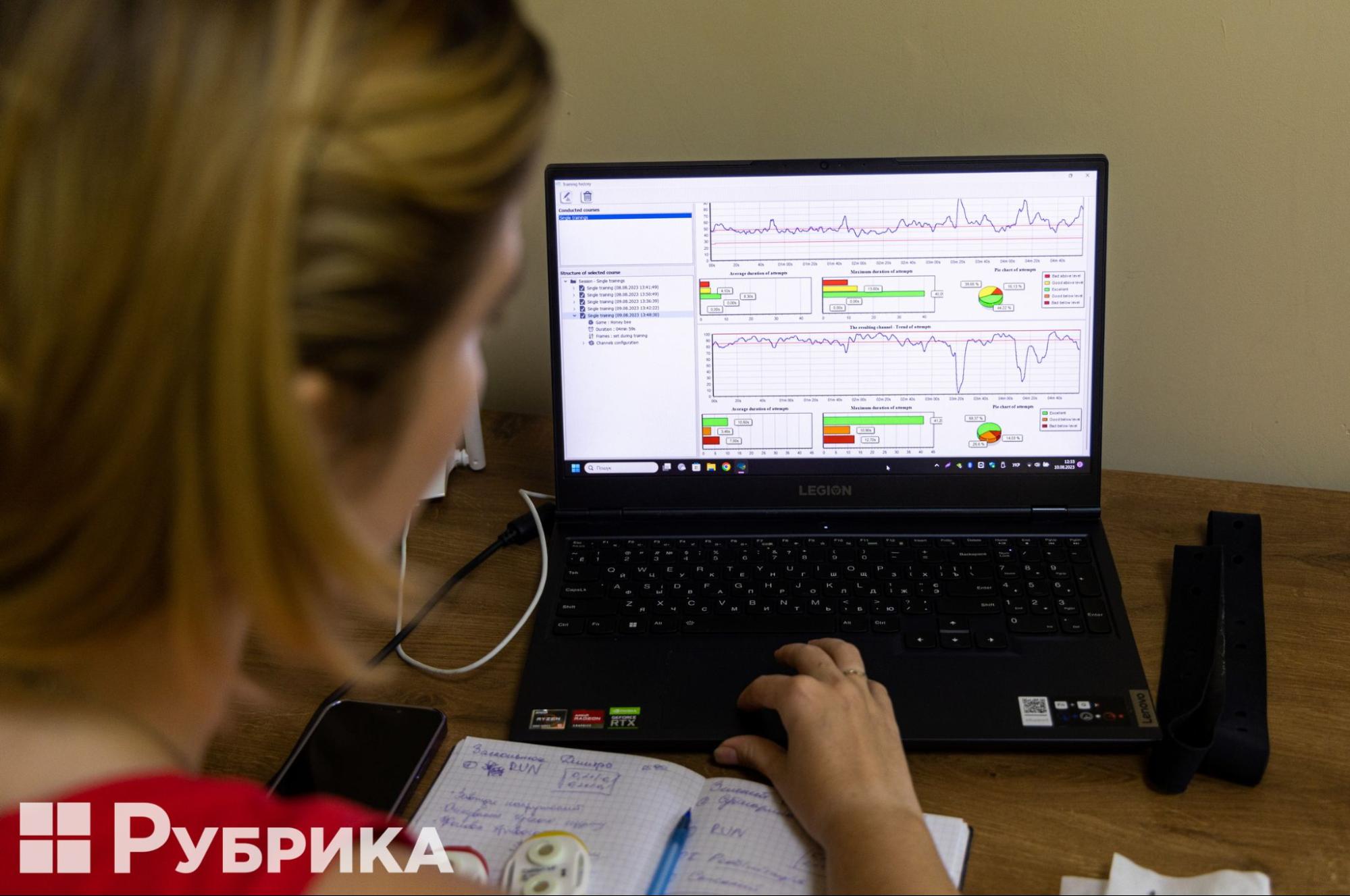 The graphs show how a person's state changes during the game.
The graphs show how a person's state changes during the game.
Games help to identify specific painful topics or triggers. For example, a person is worried about family troubles, the death of siblings, the situation with the command, or personal injuries. Some want to continue fighting, and some do not — both groups have certain fears and anxieties. There may be excess aggression that is not controlled, insomnia.
Different pictures alternate on the game slides, and if a person's brain reacts, for example, to an image of a child or a woman, it means that it plays an emotional role for a person.
"In this way, a person can answer some of his questions and understand their condition. For my part, I also see what bothers a person, and I can guide them in a certain way," says Seleznyova.
A person can try: What will happen if I breathe like this? Or will I think about this? Or I will take something in my hands for 'grounding' or listen to certain music. They try it and see if it works: if the submarine sinks, if the water in the pond becomes clearer, etc.
For example, during the session, one soldier realized that religion became a great support for him because it was prayer that helped him relieve tension.
Another example: if a service member has survived massive air raids, they may react very emotionally to the sound of an airplane in the game. These associations can be manipulated and reconfigured. A person relaxes when they realize this is just a sound or a picture in a game, not a real plane.
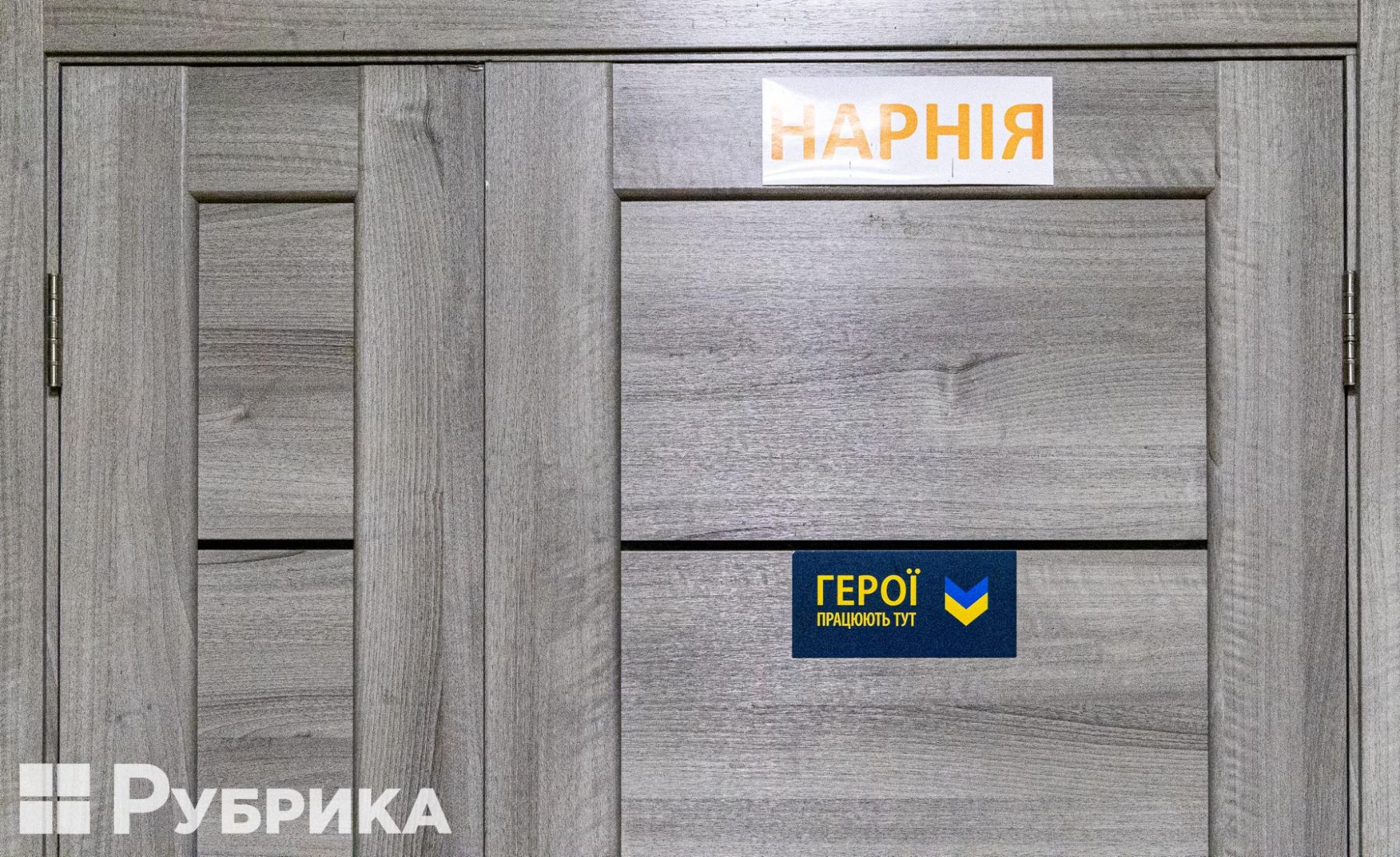
The door to the relaxation room in the Center.
During the 21 days of their stay in the Lisova Polyana, the military personnel manages to attend approximately ten neurofeedback sessions. The psychologist says this is the best option to see the difference between the first and last sessions. After all, most people say they feel better somewhere in the second week or the 15-16th day of stay in the institution.
Seleznyova has been working with the military for several months. She shared that sometimes it is quite difficult because people have had a very difficult experience: some lost their entire families due to the war and now cannot calmly watch other families walking the city streets. Some have been to Bakhmut, one of the hottest points in the east of Ukraine, three times and, after rehabilitation, will go there for the fourth time and no longer believe that they will survive. Some have seen very terrible things and cannot help talking about them. Some had a romanticized idea of the army but, in reality, faced bullying. Some are otherwise unlucky with the commander, and a lot depends on them. Some commanders are most concerned about the unit's safety and feel hyper-responsible.
It is also difficult, Seleznyova says because during her stay in the institution, the military become people who are not strangers to her. Then they go back to the war, and there is a risk that someone will not return.
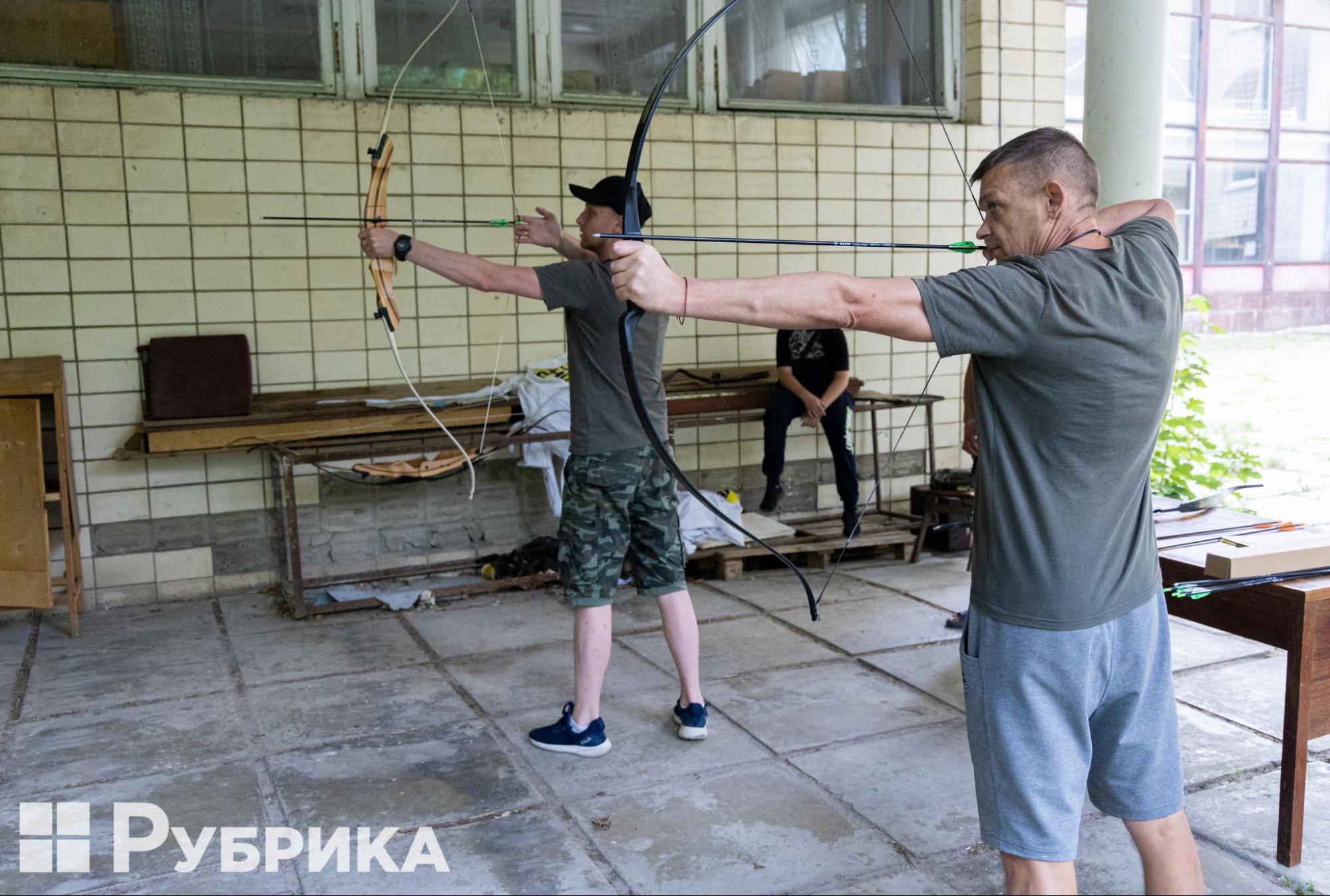
Last training before the open archery competition.
How do they help the employees themselves?
Take care of yourself to work well
There are approximately 200 employees at Lisova Polyana, and approximately half are medical personnel.
"In our institution, it is important to take care of yourself first of all because otherwise, you will not be able to provide quality help," says director Voznitsyna.
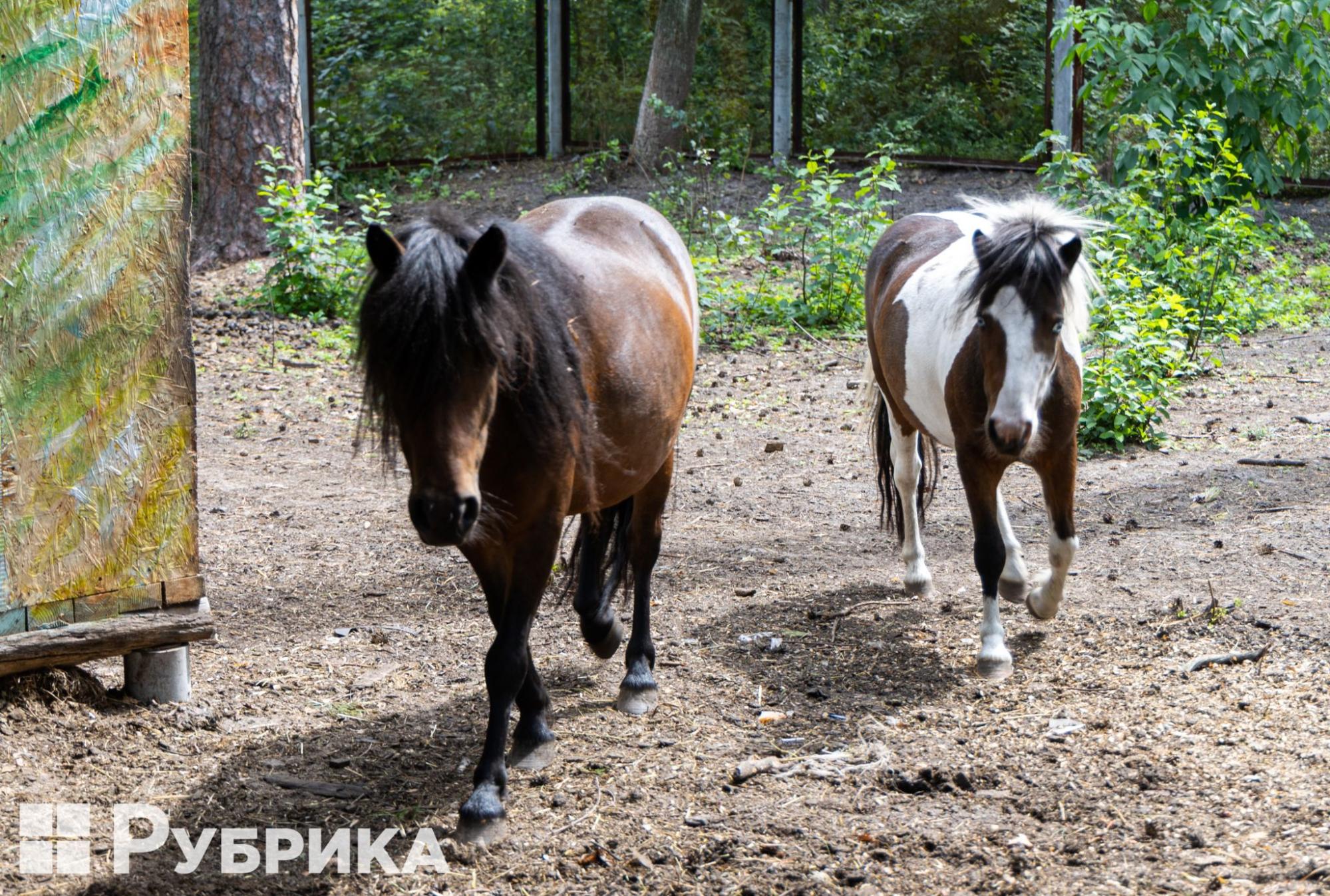
Ponies displaced from the Chernihiv region live on the territory of the institution. They rehabilitated themselves, and now they love interacting with veterans.
There are supervisions for psychologists and psychotherapists, and they are very helpful, Dana Murzova and Olena Seleznyova share. Murzova adds that the team itself adds strength, making it comfortable and easy to discuss certain cases.
Voznitsyna says that several psychologists have already been sent on short vacations for a week to prevent professional burnout:
"We saw that they took on a lot. Many colleagues also have husbands at the front, which adds to their stress," explains Voznitsyna.
Thanks to the support of the Swiss Embassy, employees of the institution often receive tickets for 10 to 15 people to the cinema, theater, and exhibitions. Now, thanks to German support, a three-day retreat for psychologists with restorative practices is planned.
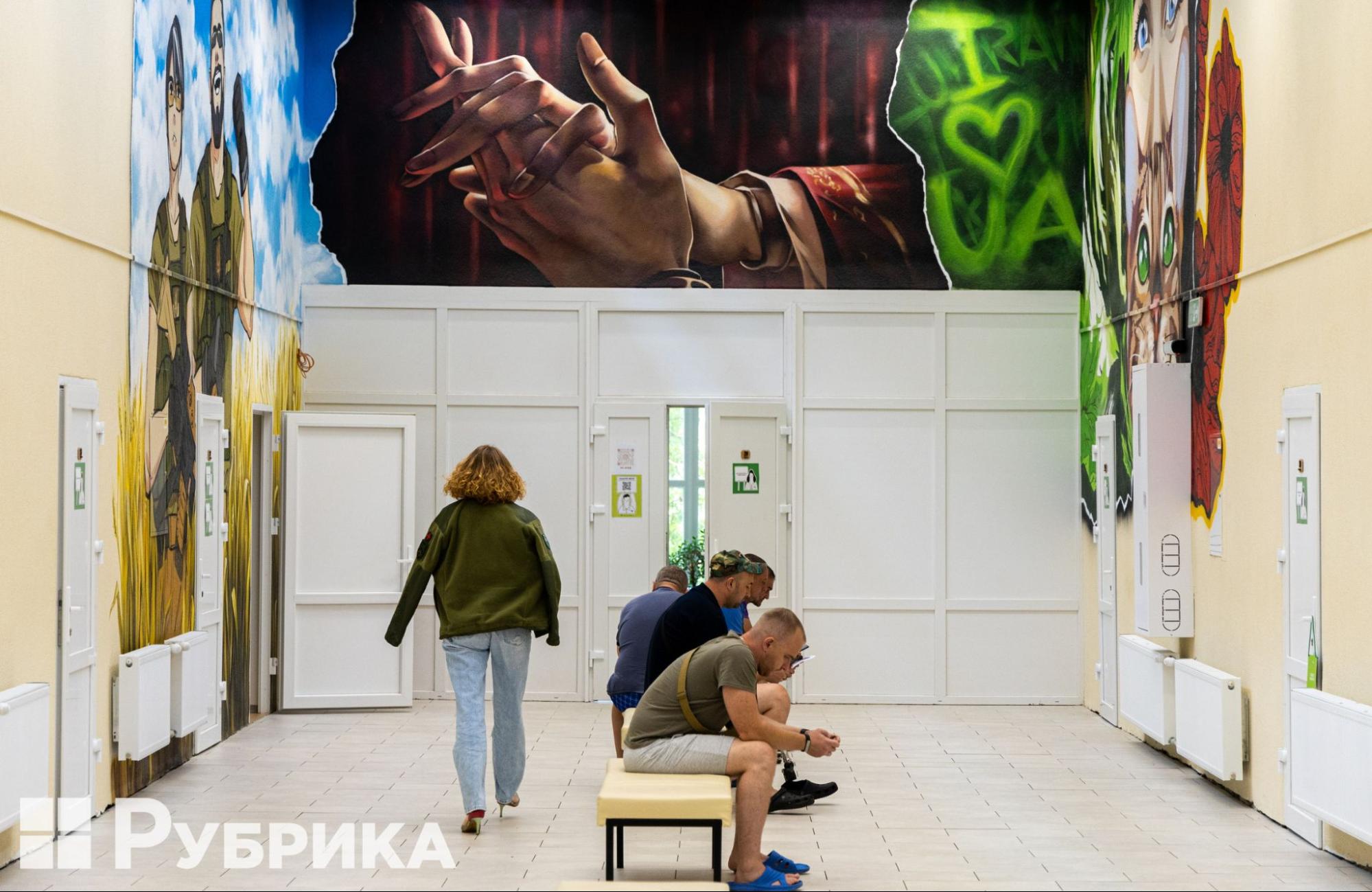
Corridor of the department where psychological consultations are held.
"Our colleagues — both doctors and nurses — can also participate in our relaxation activities, periodically we allocate time just for them," adds Voznitsyna.
Other areas of work of Lisova Polyana
Training ground
In addition to performing the main medical function, Lisova Polyana works as a training ground.
They practice and train specialists in working with people who have survived captivity and torture. The specialists learn specialized sleep yoga, narrative exposure therapy, and much more.
In addition, Lisova Polyana developed an online course, Treatment of Patients with mild craniocerebral trauma from the action of an explosive wave. It is aimed at a wide range of specialists, including family doctors, who will work with veterans.
Is this solution scalable?
Lisova Polyana organizes a workshop for specialists from all over Ukraine
Now a lot of patients and specialists come to Lisova Polyana, asking what and how it works here to organize something like this on their own. Therefore, hospital specialists, at the request of the Ministry of Health, developed a Model of a Mental Health Recovery Center. At the end of August, they will present it during a two-day workshop for representatives of regional health departments and other institutions. This is a very necessary solution because many thousands of Ukrainians need and will need rehabilitation.
How can every one of us contribute to recovery?
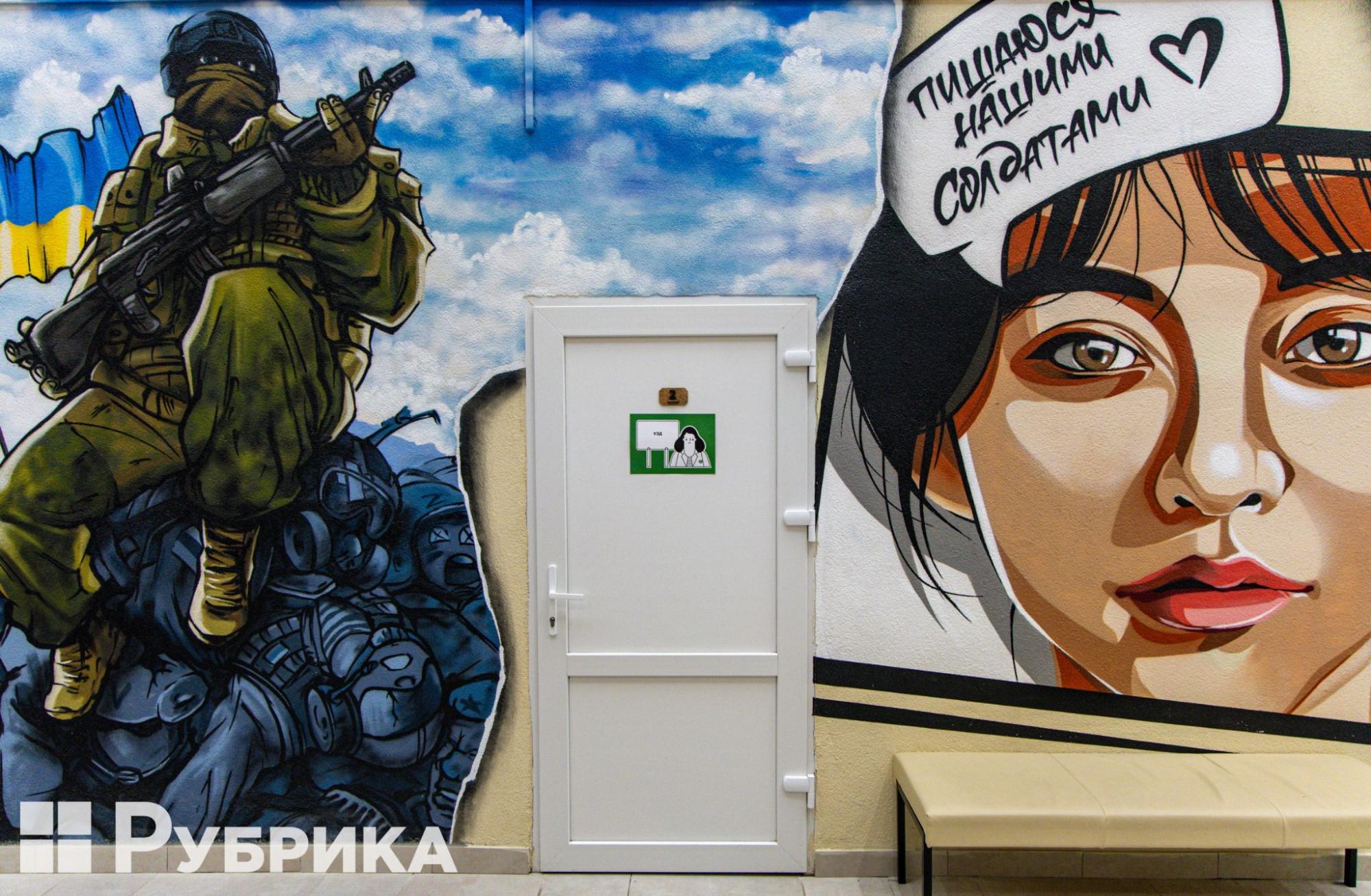
Graffiti on the wall of the Center's rehabilitation department.
In fact, our society can fully recover, and the fact that almost every second person will have PTSD after the war is a very wrong message, Voznitsyna insists. Of course, there may be certain psychological disadvantages in the form of stress reactions, but this can be dealt with.
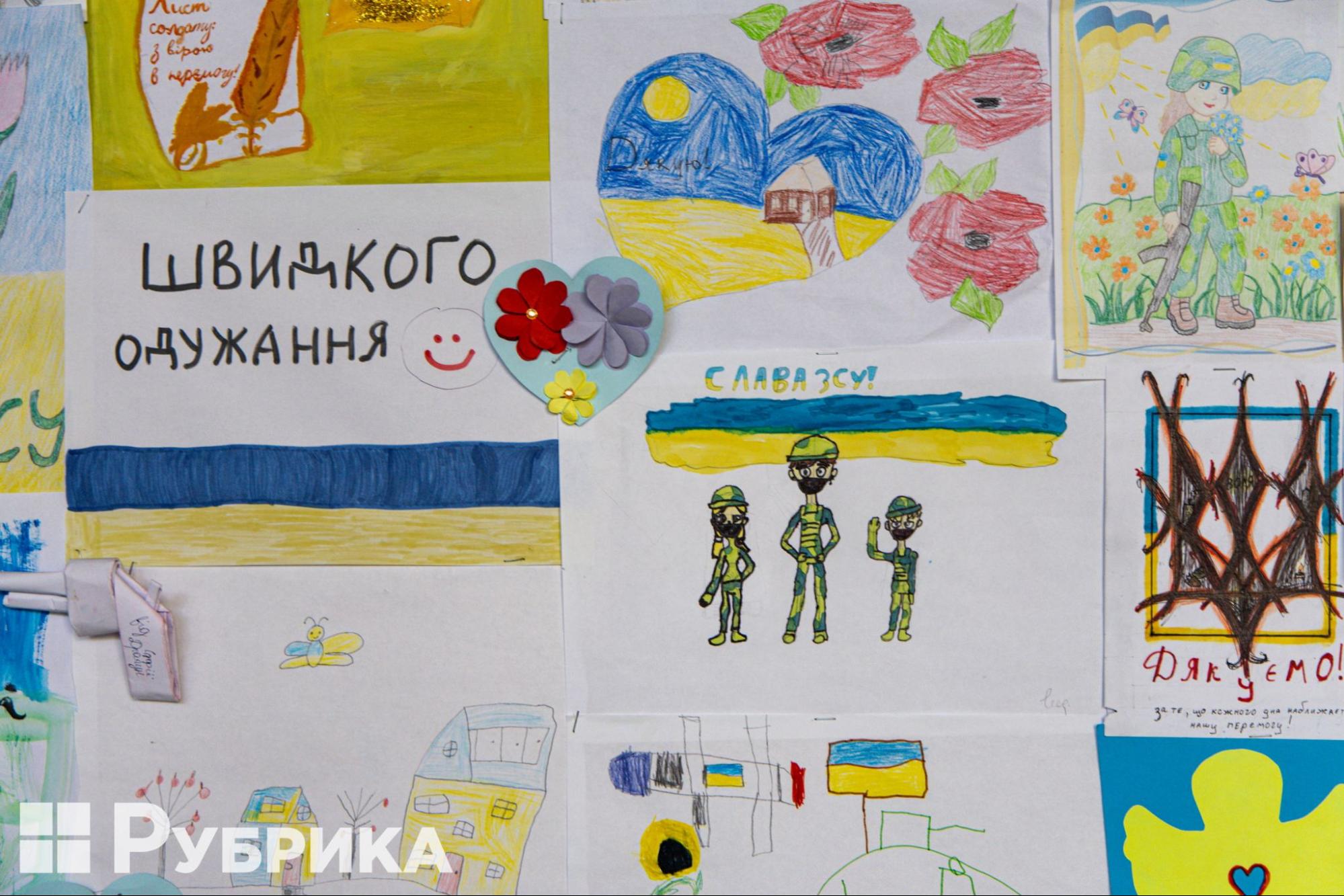
Children's drawings in the central hall of the Center.
Not everyone needs specialized help, but psychosocial support for veterans must be established — help in communities. Often it is not about mental health directly but about employment and social support of people, about support groups.
In this context, Voznitsyna favorably evaluates the initiative of the Ministry of Veterans Affairs to introduce veterans' assistants (Rubryka talked about it in more detail here), as well as the first lady's 'How are you?' program aimed at acquiring psychological self-help skills. People who have good support can heal themselves. Under such conditions, the percentage of people with chronic conditions who need periodic support and accompaniment will likely not be significant.
Photo: Mykola Tymchenko
The material was created within the framework of the Life of War project with the support of the NGO Laboratory of Public Interest Journalism and the Documenting Ukraine project at the Institute of Humanities in Vienna (Institut für die Wissenschaften vom Menschen, IWM).







